You are using an outdated browser. Please upgrade your browser or activate Google Chrome Frame to improve your experience.

136 Useful German Travel Phrases
Planning your big trip to Germany is so exciting—but you’re not done until you’ve brushed up on common German phrases for travel.
In this post, you’ll find a handy phrasebook of German travel phrases and vocabulary , conveniently organized by group. You’ll also learn about some great resources, such as travel language guides and handy apps for your smartphone.
German Greetings, Introductions and Goodbyes
German expressions for shopping, german travel phrases for the restaurant, german words and phrases for directions, german travel phrases for public transportation, german travel phrases for the hotel, german phrases for getting around the city, german words and expressions for emergencies, german expressions for language help, german guides for traveling, german apps for travelers, why you should learn german travel phrases, and one more thing....
Download: This blog post is available as a convenient and portable PDF that you can take anywhere. Click here to get a copy. (Download)
Please note that most of these German sentences are in the formal Sie conjugation. For your travel purposes, this form should be just fine, although native speakers may opt to use different pronoun forms with you depending on the context.

A trusty guide fits in your backpack or purse, and it serves as a way to look up unfamiliar words and phrases or brush up on vocab while traveling from one place to another. Here are some recommendations:
“Rick Steves’ German Phrase Book and Dictionary”
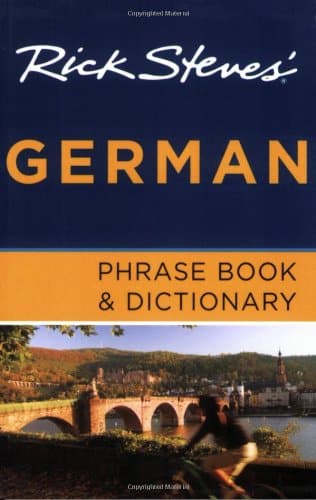
You can’t go wrong with Rick Steves, since the man has traveled all over Europe (numerous times), hosted his own travel show and written dozens of bestselling guides for European travel.
From meeting new people to ordering a bratwurst, this guide outlines the most common everyday phrases to further improve your travel lingo. It also comes with phonetic spellings , currency information, rail transportation guides and a cheat sheet that you can tear out and slide in your pocket.
“German Survival Guide”
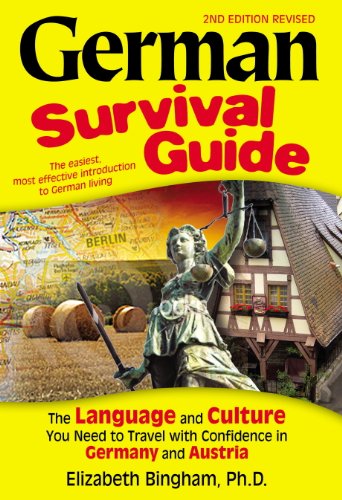
This guide can give you the confidence to speak with people while traveling through Germany and Austria. It touches on cultural points and shows you how to interact with German speakers a various spots such as the Autobahn, grocery stores, ice cream parlors and more.
It includes vocabulary and basic German instruction , with travel and study tips scattered throughout the entire guide. It’s a rather helpful book for your travels if staying in Germany or Austria for quite some time.
Lonely Planet German Phrasebook and Dictionary
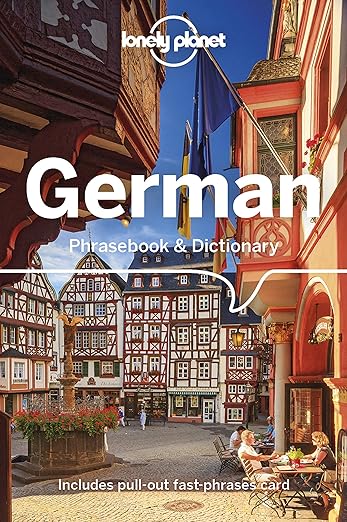
This German phrasebook has a huge section for decoding restaurant menus and ordering food properly, plus a 3,500-word two-way German-English dictionary.
The cultural manners section can prevent you from embarrassing yourself or making others feel uncomfortable and help you feel at ease while traveling.
Lonely Planet at large has tons of German phrasebook and travel guide options available on their site. Read these ahead of time to know what to expect wherever you go, then bring them on your trip to whip out at a moment’s notice.
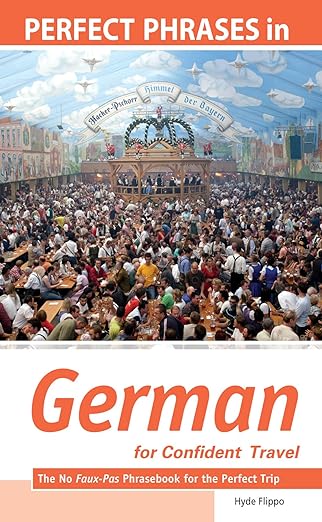
“Perfect Phrases in German for Confident Travel”
Context and manners are extremely important when going to Germany, just like they are in every country. If you insult a person’s language, why would they talk to you in return?
The “Perfect Phrases” book details the proper words and phrases to use while traveling, while also discussing faux pas and how they can hurt your conversation.
“Point it: Traveller’s Language Kit”
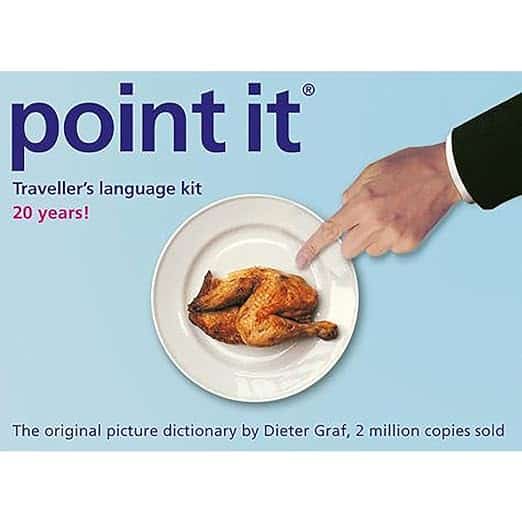
This guide may not help you much with your pronunciation, but it’s an essential tool to bring with you while traveling in German-speaking countries.
The “Point It” book has 1,300 images and words, so you can point at the images when your speaking abilities fail. For example, point to the picture of a chicken when ordering at a restaurant.
A good app can serve as a viable replacement for a travel and language guide that doesn’t add any weight to your pack. Plus, the apps generally offer audio to hear how to pronounce certain words and phrases. Here are some great options:
Learn German Phrases & Words: Phrases for Travel in Germany
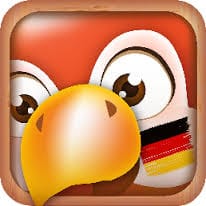
The Learn German Phrases & Words app is designed to boost your speaking capabilities while traveling. It can be used without an internet connection, so you can always depend on it.
The visual guide has carefully categorized sections like greetings, eating, romance and health. The app has over 800 common German phrases, and the German-speaking parrot pronounces everything for you.
Learn German – Phrasebook
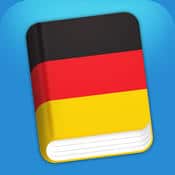
This phrasebook is free, but you can upgrade to receive all of the phrases and words for your travels. The app works as a quick reference perfect for tourists visiting Germany.
The main page shows categories like numbers, general conversation and transportation. Once you select a category and phrase, it gives you the option to hear a spoken version and slow down the audio for better understanding.
Wie Geht ‘s German

The Wie Geht ‘s app provides a few lessons with audio tracks that are useful while moving around the world. It has a travel section filled with options like directions, meeting people, weather, shopping, money and more.
Membership is required to get most of the content. The app is formatted like a class, but feel free to skip around and use the examples when you come across a moment when they are needed.
Germany Travel Guide Offline

The German Travel Guide app is not going to help you much with your German learning, but it may prevent you from getting lost.
The app works online and offline, with detailed maps for navigating cities like Berlin, Munich and Hamburg. Check out weather, time and fun suggestions while moving around the cities.
With this app, you can immerse yourself in the German language and culture before stepping foot in Germany.
FluentU takes authentic videos—like music videos, movie trailers, news and inspiring talks—and turns them into personalized language learning lessons.
You can try FluentU for free for 2 weeks. Check out the website or download the iOS app or Android app.
P.S. Click here to take advantage of our current sale! (Expires at the end of this month.)

Try FluentU for FREE!
- Even if you can’t have a fluent conversation, native German speakers always appreciate when foreigners put the effort into learning a bit of their language . It shows respect and demonstrates that you truly want to reach out and connect with people while abroad.
- You won’t be totally reliant on your German phrasebook. Yes, your German phrasebook has glossy pages and you love getting the chance to use it—but you want to be able to respond quickly when people speak to you, at a moment’s notice.
- If you can express yourself with some basic German phrases , you are less likely to be taken advantage of by taxi drivers, souvenir shops and waiters!
- The perception that all German speakers speak English is simply not true. Even in big German cities you’ll find loads of people that know very little English. You don’t want to have to track down other English speakers every time you have a question or want to make a friend.
Try practicing some of these phrases out loud to get your pronunciation right before leaving on your travels.
Before we part ways, there’s one final German travel phrase you need to know: Gute Reise! (Have a good trip!)
Want to know the key to learning German effectively?
It's using the right content and tools, like FluentU has to offer ! Browse hundreds of videos, take endless quizzes and master the German language faster than you've ever imagine!

Watching a fun video, but having trouble understanding it? FluentU brings native videos within reach with interactive subtitles.

You can tap on any word to look it up instantly. Every definition has examples that have been written to help you understand how the word is used. If you see an interesting word you don't know, you can add it to a vocabulary list.

And FluentU isn't just for watching videos. It's a complete platform for learning. It's designed to effectively teach you all the vocabulary from any video. Swipe left or right to see more examples of the word you're on.

The best part is that FluentU keeps track of the vocabulary that you're learning, and gives you extra practice with difficult words. It'll even remind you when it’s time to review what you’ve learned.
Start using the FluentU website on your computer or tablet or, better yet, download the FluentU app from the iTunes or Google Play store. Click here to take advantage of our current sale! (Expires at the end of this month.)
Related posts:
Enter your e-mail address to get your free pdf.
We hate SPAM and promise to keep your email address safe

- Application process for Germany VISA
- Germany Travel Health Insurance
- Passport Requirements
- Visa Photo Requirements
- Germany Visa Fees
- Do I need a Visa for short stays in Germany?
- How to Get Flight Itinerary and Hotel Booking for Visa Application
- Germany Airport Transit Visa
- Germany Business VISA
- Guest Scientist VISA
- Germany Job Seeker Visa
- Medical Treatment VISA
- Tourist & Visitor Visa
- Trade Fair & Exhibitions VISA
- Training or Internship VISA
- Study Visa for Germany
- Working (Employment) VISA
- German Pronunciation
- German Volabulary
- Requirements
- Health Insurance
- Trend & Living
- Free Assessment Form
- Privacy Policy
50 Essential German Phrases for Tourists: English Translations and Pronunciations

If you’re planning a trip to Germany, it’s always helpful to know a few basic phrases in German to help you navigate your way around the country. This guide provides 50 essential German phrases for tourists, along with their English translations and pronunciations. From ordering food in a restaurant to asking for directions, these phrases will come in handy during your visit to Germany.
Table of Contents
Here are 50 essential german phrases for tourists traveling in germany, with their english translations and german pronunciations:.
Read also: Offensive German Vocabulary: 50 Words You Should Avoid Using
- Hello – Hallo (hah-loh)
- Goodbye – Tschüss (chooss)
- Please – Bitte (bit-teh)
- Thank you – Danke (dahn-keh)
- You’re welcome – Bitte (bit-teh)
- Excuse me – Entschuldigung (ent-shool-dee-goong)
- Do you speak English? – Sprechen Sie Englisch? (shpre-chen zee eng-lish?)
- I don’t understand – Ich verstehe nicht (eekh fer-shtay-eh nikht)
- How much does it cost? – Wie viel kostet es? (vee feel kohs-tet ess?)
- Where is the bathroom? – Wo ist die Toilette? (vo ist dee toh-let-teh?)
- Can you help me? – Können Sie mir helfen? (kern-nen zee meer hell-fen?)
- I would like… – Ich möchte… (eekh merkh-teh…)
- Do you have…? – Haben Sie…? (hah-ben zee…?)
- Yes – Ja (yah)
- No – Nein (nine)
- Excuse me, is this seat taken? – Entschuldigung, ist dieser Platz besetzt? (ent-shool-dee-goong, ist dee-zer platz beh-zetst?)
- What is your name? – Wie heißen Sie? (vee hi-sen zee?)
- Nice to meet you – Freut mich, Sie kennenzulernen (froit mikh, zee ken-nen-tsuh-lern-en)
- Can you recommend a good restaurant? – Können Sie ein gutes Restaurant empfehlen? (kern-nen zee ighn goot-es rest-o-rahnt em-pfeh-len?)
- I’m allergic to… – Ich bin allergisch gegen… (eekh bin ah-ler-gish geh-gen…)
- Is there a pharmacy nearby? – Gibt es eine Apotheke in der Nähe? (gibt ess igh-nuh ah-po-teh-keh in dare neh-eh?)
- Could you call me a taxi, please? – Könnten Sie mir bitte ein Taxi rufen? (kern-nen zee meer bit-teh ighn tahk-see roo-fen?)
- Where can I find a map? – Wo finde ich eine Karte? (vo fin-deh eekh igh-nuh kahr-teh?)
- Can you show me on the map? – Können Sie es mir auf der Karte zeigen? (kern-nen zee ess meer auf dare kahr-teh tsigh-gen?)
- I need a doctor – Ich brauche einen Arzt (eekh brow-khe igh-nen ahrtst)
- I’m lost – Ich habe mich verlaufen (eekh hah-beh meekh fer-lah-fohn)
- Is it safe here? – Ist es hier sicher? (ist ess heer zee-cher?)
- Is there Wi-Fi here? – Gibt es hier Wi-Fi? (gibt ess heer wee-fie?)
- How do I get to…? – Wie komme ich nach…? (vee kohm-meh eekh nahkh…?)
- What time is it? – Wie spät ist es? (vee shpayt ist ess?)
Read also: 45 Ways to Save Money During Your Trip to Europe
- Can you tell me the way to…? – Können Sie mir den Weg nach… erklären? (kern-nen zee meer den vayg nahkh…er-kla-ren?)
- I would like to book a room – Ich möchte ein Zimmer reservieren (eekh merkh-teh ighn tsim-mer reh-zer-vee-ren)
- Is breakfast included? – Ist Frühstück inklusive? (ist frooh-shtook in-kloo-see-veh?)
- What time is breakfast served? – Wann gibt es Frühstück? (vahn gibt ess frooh-shtook?)
- Can I pay with a credit card? – Kann ich mit Kreditkarte zahlen? (kahn eekh mit kreh-dit-kahr-teh tsah-len?)
- What is the exchange rate? – Wie ist der Wechselkurs? (vee ist dare vek-sel-kurs?)
- Can I get a discount? – Kann ich einen Rabatt bekommen? (kahn eekh igh-nen rah-baht geh-kom-men?)
- I need a wake-up call – Ich brauche einen Weckruf (eekh brow-khe igh-nen vehk-roof)
- Is there a safe in the room? – Gibt es einen Safe im Zimmer? (gibt ess igh-nen zahf-eh im tsim-mer?)
- Can I have some more…? – Kann ich noch etwas…haben? (kahn eekh nokh ess-tas…hah-ben?)
- How far is it to…? – Wie weit ist es bis…? (vee vight ist ess bis…?)
- What is the best way to get to…? – Wie komme ich am besten nach…? (vee kohm-meh eekh am bes-ten nahkh…?)
- I’m sorry – Es tut mir leid (ess toot meer liyt)
- What is the weather like today? – Wie ist das Wetter heute? (vee ist dahs vet-ter hoy-teh?)
- Do you have a menu in English? – Haben Sie eine Speisekarte auf Englisch? (hah-ben zee igh-nuh shpy-suh-kahr-teh owf eng-lish?)
- Could you please bring me the bill? – Könnten Sie mir bitte die Rechnung bringen? (kern-nen zee meer bit-teh dee rek-noong bren-gen?)
- Is there a tourist information center nearby? – Gibt es ein Touristeninformationszentrum in der Nähe? (gibt ess ighn too-ris-ten-in-fohr-ma-tsee-ons-tsent-room in dare neh-eh?)
- How do I get to the train/bus station? – Wie komme ich zum Zug/Busbahnhof? (vee kohm-meh eekh tsuhm tsug/boos-bahn-hof?)
- Can I have a glass of water, please? – Kann ich bitte ein Glas Wasser haben? (kahn eekh bit-teh ighn glahs vah-ser hah-ben?)
- Have a nice day – Einen schönen Tag noch (igh-nen shern-en tahg nokh)
With this guide, you now have a handy resource to help you communicate with locals during your trip to Germany. Don’t be afraid to practice these German Phrases for Tourists and immerse yourself in the local culture. Whether you’re a first-time visitor or a seasoned traveler, these essential German phrases will help you make the most of your trip
More articles
From lyrics to pronunciation: learn the german national anthem, deutschlandlied, navigating the german language: a comprehensive starter vocabulary, 150+ common german phrases to sound like a native speaker, leave a reply cancel reply.
Save my name, email, and website in this browser for the next time I comment.
Difference between ein, eine, einen, and einem in the German Language
Some cheap and expensive things in germany, german essays on my family: meine familie, german universities where we can apply, without uni-assist, latest article, studying in germany 2024: a comprehensive guide for international students, navigating the germany work visa application process for indians, 56 tuition free master’s programs in computer science in germany – explore your options today, your gateway to germany: 20 universities where you can apply without uni-assist.

Plan For Germany
© Plan for Germany. All rights reserved.
Sister Sites
Popular category.
- German Language 40
- Lifestyle 35
- Trend & Living 30
- Level A1 23
Editor Picks

60 Essential German Travel Phrases
Are you planning a trip to a German-speaking country? There are so many reasons for learning basic German travel phrases before you jump on that plane. And we invite you to try out Drops to learn more than 2500 useful German words and phrases !
The locals will appreciate any effort you make to speak the local language. You’ll make traveling far easier on yourself as you’ll be able to communicate more clearly. You can get to know people who don’t speak English and experience a different culture.
Despite the common belief, not everyone speaks English. Even if you are planning a city break, it will be appreciated if you make an effort to speak a bit of German. It’s a sign of respect for the people in the country you are visiting.
If you want to venture away from the cities, you’ll likely encounter a lot of people who hardly speak any English at all. So it’s worth being prepared!
So let’s dive right in and take a look at my favorite tried and tested German travel phrases.

German Greetings & German Basics
Hallo - “hello”
Tschüss - “bye”
Auf wiedersehen - “goodbye”
Tschau - “ciao”
Guten Morgen - "good morning”
Guten Tag - "good day”
Guten Abend - "good evening”
Gute Nacht - "good night”
Danke / Vielen Dank / Dankeschön - " thanks” and “many thanks”
There are a few ways to say thank you in German. Just use danke for now but expect to hear the other versions as well.
Bitte - "please”
Sorry - "sorry”
Entschuldigen Sie bitte - "excuse me” or “sorry”
Ja - "yes”
Nein - "no”

German Phrases You Might Hear
You might also hear the following German expressions:
Gerne - "gladly” or “my pleasure”
Bitte schön - "there you go” or “you’re welcome”
Both of these are often used in restaurants and cafes, when the waiting staff bring your food or drinks over, and also in shops. More on that later!
German Phrases in the Hotel
One of the first things you’ll do when you arrive in a German-speaking country is check into your hotel. There are a few standard phrases which you can use, and the checking in procedure usually follows the same pattern.
The receptionist will ask if you have a reservation (listen for ‘Reservierung’ ), they’ll ask your name (listen for ‘Name’ [Nahmeh] ) and they’ll give you your key (listen for ‘Schüssel’ ).
Checking in to the Hotel in German
Kann ich bitte einchecken? - “Can I check in please?”
Ich habe eine Reservierung - “I have a reservation”
Mein Name ist (...) - “My name is (...)”
Ich bleibe bis Montag hier / bis zum vierundzwanzigsten (24th) Juni hier - “I’m staying here until Monday / until the 24th June”
Wann / wo gibt es Frühstück? - ”When is breakfast?”
Gibt es hier WLAN [vee-lan]? - “ Is there wifi here?”
Wie lautet das WLAN-Passwort? - “What is the wifi password?”
Um wie viel Uhr muss man auschecken? - “By what time must I check out?”
Kann ich bitte auschecken? - “ Can I check out, please?”
What You May Hear in German at the Hotel
Haben Sie eine Reservierung? - “Do you have a reservation?”
Wie ist Ihre Name? - “What is your name?”
Bleiben Sie hier für drei (3) Nächte / eine (1) Woche / zwei (2) Wochen? - “Are you staying here for 3 nights / 1 week / 2 weeks?”
Frühstück ist bis sieben (7) Uhr bis zehn (10) Uhr - “Breakfast is from 7am until 10am”
Ihre Zimmernummer ist… - “Your room number is…”
Shopping in German
If you’re out exploring the city, you’ll probably want to do a bit of shopping for souvenirs. The first phrase (ich schaue mich nur um) in this section was pretty essential for me in the early days when I was too nervous to speak much German. If a shop assistant comes up to help and you’re just having a look around or you’re too nervous to speak, this phrase can come in handy.
What You Can Say When Shopping in German
Ich schaue mich nur um - “I’m just looking around”
Ich suche nach… - “I’m looking for…”
Wie viel kostet das? - “How much does that cost?”
Kann ich mit Bargeld / Kreditkarte bezahlen? - “Can I pay with cash / credit card?”
Könnte ich eine Tüte haben? - “Could I have a bag?”
What You May Hear While Shopping in German
Kann ich Ihnen helfen? - “Can I help you?”
Möchten Sie es probieren? - “Would you like to try it?”
Eating Out in German
When it comes to eating out, this is a really great way to practice a bit of basic German. You only need a few phrases to get by. Your power phrase in this section is ich hätte gern… which you can use for any food or drink order. It’s very polite and the serving staff will appreciate it.
Like when checking into the hotel, there is usually a set pattern to look out for when in a cafe or restaurant:
The waiter will ask for your drinks order (listen for trinken ), they will then ask for your food order (listen for essen ) and later they will ask if you’d like a dessert (listen for Nachtisch ).
What You Can Say in German When Dining Out
Haben Sie ein Tisch für ein (1) / zwei (2) / drei (3) Person(en)? - “Do you have a table for 1 / 2 / 3 person / people?”
Ich hätte gern (…) bitte - “I would like (...) please”
- einen schwarzen Tee (mit Milch) - “a black tea (with milk)”
- einen Kaffee - “a coffee”
- ein Mineralwasser - “a mineral water”
- ein Glas Rotwein - “a glass of red wine”
- ein Glas Weißwein - “a glass of white wine”
- ein Bier - “a beer”
Könnte ich ein stück Kuchen haben? - “Could I have a piece of cake?”
Was empfehlen Sie? - “What do you recommend?”
Kann ich bitte bezahlen? - “Can I pay please?”
What You Might Hear in German at a Restaurant
Was möchten Sie? - “What would you like?”
Ich empfehle (...) - “I recommend (...)”
Was möchten Sie trinken? - “What would you like to drink?”
Was möchten Sie essen? - “What would you like to eat?”
Möchten Sie die Nachtischkarte? - “Would you like the dessert menu?”

Sightseeing in German
When you’re out sightseeing, you’ll probably be able to find an English language tour guide. But there are a lot of situations where you might be on your own and need to ask where something is. The simple phrase wo ist… is very useful and easy to remember.
Entschuldigen Sie bitte - “excuse me please”
Wo ist (…)? - “Where is (...)?”
- die Touristeninformation - “the tourist information”
- das Stadtzentrum - “the city centre”
- das Museum - “the museum”
- der Dom - “the cathedral”
- das Rathaus - “the town hall”
- der Bahnhof - “the train station”
When You Struggle to Understand German
If all else fails, here are some phrases to memorize to help you if you have trouble understanding German. Trust me, I used these a lot when I first started visiting Germany. If you’re a bit nervous about your German, committing a few of these phrases to memory can help you get out of tricky situations.
Ich verstehe nicht - “I don’t understand”
Ich spreche kein Deutsch - “I don’t speak German”
Mein Deutsch ist nicht so gut - “my German is not so good”
Sprechen Sie Englisch? - “Do you speak English?”
Langsamer bitte - “slower please”
Können Sie das bitte wiederholen? - “Can you repeat that, please?”
Was bedeutet (…)? - “What does (...) mean?”
Bitte haben Sie Geduld mit mir - “please be patient with me”
So now you know all my essential German travel phrases! These helped me out a lot, and I hope you find them useful on your travels, too!
Ready to learn more? Try Drops!
About the Author: Emma Jackman is the founder of Emma Loves German an all-round resource for German learners. You’ll find articles on speaking, reading, writing, and listening in German as well as grammar tips, frequently used phrases, and other language learning tips.
"Love my fun language learning and practice with daily Drops sessions, and monthly Challenges to participate in, and quiz mode to test contextual learning - brilliant! So much thought, consideration and inclusivity has gone into the design and function of this app, I can't praise it highly enough."
"Great little learning app! I've learned at least 5-10 new words in Spanish in my first 5 minutes. Easy to pick up and thorough."
"Great language learning app! It helps you get daily words done in a short amount of time. I would highly recommend using drops to learn whatever language you want to learn."
"What an amazing app! I’ve tried several apps for language learning and I cannot recommend Drops enough. I don’t know how a short Drops session can teach me as much as 1 hour+ of focused use of other apps, it’s like magic."
"Amazing language learning tool. Excellent app for increasing vocabulary in your foreign language of choice. Useful for beginner, intermediate, and advanced learners. The repetition of the words makes them much easier to remember, and without the hassle of making your own flash cards. I have used Drops for two years now and have seen great results."
"Very engaging way of learning Yoruba in a stimulating way. Will be using to learn myself and to teach my child!"
"Less than a week in but using this alone with the popular one babbel working on German. When using just one app I got bored, babbel is not as fun. So using both at once actually let's my adhd do its thing but I still focused since I can switch easily between both apps and work in different areas. Also I like the quick little sessions makes me feel like I actually did something."
"So engaging. I speak Spanish well, but often forget words in conversation that I know I should know. This game is fun and quickly brings back vocabulary I may have put in the back of my brain after not using it for awhile. Case in point: I spent 11 years in construction, then went back to teaching in English and/or Spanish depending on the teacher/student"
"Amazing app"
"I have been desperate to find an app that really helps me learn Japanese and this is the best by far"
"I like that you can switch between different subjects and topics constantly and it’s really easy to learn a lot of vocabulary very quickly! This works perfect for me because I can learn a lot of words but then practice sentence structure with my grandmother whose from Croatia"
"Fantastic app great opportunity to learn languages on your spare time. Drops makes it easy to learn and retain words to formulate sentences."
"Best of the best. Awesome app in every sense"
"This app us the best and how I am doing Learning Ukraine is Helping me alot tnx"
"Definitely recommend! I'm using this to learn mandarin 10/10"
"Fun and interactive. Great for repetition!"
- Drops iOS | Android
- Scripts iOS | Android
- Droplets iOS | Android
- Visual Dictionary
- Available Languages
Work with Us
- Partnerships

47 Survival German Travel Phrases [You Need To Know]
Are you dreaming about your next trip to Germany? Maybe this is your first visit and you’re keen to blend in. Or perhaps you’ve visited German speaking countries a few times but always resorted to using English.
In this post you will discover 47 tried and tested German travel phrases that have worked well for me on my many trips to Germany. You’ll also hear audio of each of the phrases.
After reading this post you will:
- Know how to say 47 essential German travel phrases
- Hear how each of the phrases sound
- Be able to mix and match which ever phrases you want to try out on German speakers
Why Learn German Travel Phrases?
Before we get started I want to give you a quick pep talk.
If you’re travelling to a German speaking country any time soon, you may head there with the idea that ‘everyone speaks English’.
If you’re heading for a city break, you’ll probably meet people in the tourist industry that do speak a bit of English. But once you step off the tourist path, you’ll realise that many people don’t speak much English at all.
Even if you’re opting for a city break, it shows a great deal of respect to the local people to at least learn how to say ‘hello’, ‘please’ and ‘thank you’ in German. If you expand your knowledge and learn how to say more German tourist phrases such as ‘I would like’ or ‘can I check in?’ the person you’re speaking to will be really impressed.
In my many trips to Germany, I’ve learned to never be afraid of speaking German with the locals. Even during my earlier visits when I tried and butchered that poor language, the German speakers I spoke to were so happy that I was even trying.
Don’t let the fear of making mistakes stop you from trying. Even if you mostly speak English, then throw in one of these German travel phrases somewhere, you’ll make progress.

Common German Words
Let’s make a start with the most common German travel phrases and words you’ll encounter as a tourist. These are simple pleasantries that will be appreciated by the locals. So make sure you learn some of these even if you don’t learn anything else.
Ready to finally master German sentence structure?
Download your German Sentence Structure Cheat Sheet for just $1 and get your sentences to flow naturally.

Asking For Help / Not Understanding
Whenever you’re in a country where you don’t speak a lot of the language, it’s always helpful to learn a few ’emergency phrases’.
For example, one time when I was in Germany, but didn’t know much German at that point, another guest in a hotel started chatting to me in German. My go-to phrase to politely end a conversation was sorry, mein Deutsch ist nicht so gut (sorry, my German isn’t very good).
And just so you know, in a real emergency, the emergency number in Germany is 112.
Whether you’re stopping for a quick coffee or a full on meal, there are loads of chances to practice some German travel phrases with the waiting staff when you order food and drink in German . At the very least, memorise ich hätte gern … (I would like…) and then add your drink or meal of choice. It’s really polite and shows a lot of respect to the person serving you to order in this way.
Some key words to listen out for are trinken (drink) and essen (eat). These are great words to train yourself to listen for so you can get a feel for what is being asked.

In a hotel you’re most likely to meet English speakers, but if you want to practice some German, the receptionists are usually very happy to speak to you. Why not try some of these essential phrases out?
Getting Around & Directions
Thanks to Google Maps, you probably won’t need to ask a local for directions, but it’s always helpful to know how to ask the way to the toilet / bathroom if you’re in a café.
One thing to keep in mind when shopping in Germany, is that you’ll encounter shops, cafés and restaurants that only accept cash. So it’s a good idea to check before you order.
German has 3+ words for receipt, and in my experience they seem to be interchangeable. One way of saying receipt isn’t limited to the area you’re in, so you might hear Quittung, Bon and Beleg being used all in the same city. Keep your ears alert for these tricky words!
So there you go, 47 essential German travel phrases, all tried and tested and ready for you to use on your next trip.
Leave a Reply Cancel reply
Your email address will not be published. Required fields are marked *
Save my name, email, and website in this browser for the next time I comment.
Confused by German sentence structure? 🤯 Download your cheat sheet for just $1
Thank You 🙌
Ultimate German Vocabulary List: 100 German Phrases for Travel
Are you planning a trip to a German-speaking country? Then you will need to learn some key vocab before you go. In this ultimate German vocabulary guide, we’ve compiled 100 essential phrases and basic German vocabulary list to help you navigate various situations during your travels.
From greetings and introductions to ordering food, asking for directions, and handling emergencies, this comprehensive list has got you covered. Whether you’re a beginner or have some prior knowledge of German, these phrases will enhance your travel experience and make communication easier.
Read on to equip yourself with the necessary tools to explore and connect with locals in Germany with confidence.
Greetings in German
Let’s start with the most common German words and phrases for greetings .
- Hallo – Hello Hallo is a commonly used German greeting that is equivalent to “hello” in English. It is a versatile and informal greeting suitable for both casual and formal settings.
- Guten Morgen – Good morning Guten Morgen is used to greet someone in the early hours of the day. It is a polite and friendly way to start the day.
- Guten Tag – Good day This is a standard greeting used throughout the day.
- Guten Abend – Good evening This is used to greet someone in the evening or late afternoon.
- Servus – Hi/Bye Servus can be used to say both “hi” and “bye” and is commonly used among friends and acquaintances.
- Grüß Gott – Greetings to God Grüß Gott is a regional greeting predominantly used in Southern Germany and Austria. It is a respectful way of saying hello.
- Moin – Hi Moin is a common greeting used in Northern Germany, particularly in Hamburg and the surrounding regions. It is an informal way of saying “hi” and is used throughout the day.
- Wie geht es Ihnen? – How are you? This is a formal way of inquiring about someone’s well-being. It is a polite and considerate way to start a conversation.
- Auf Wiedersehen – Goodbye This phrase is a standard farewell used in German. It is a formal and respectful way to part with someone.
- Tschüss – Bye Tschüss is suitable for both informal and formal settings and is widely recognized across Germany.
Introductions in German
When meeting new people , it’s standard to introduce yourself. Below are common words and phrases to use when introducing yourself, especially when trying to make friends in a German-speaking country.
- Mein Name ist… – My name is…
- Wie heißt du? – What is your name?
- Schön dich kennenzulernen – Nice to meet you
- Woher kommst du? – Where are you from?
- Ich komme aus.. . – I come from…
- Wie geht es dir? – How are you?
- Es freut mich, dich kennenzulernen – I’m pleased to meet you
- Darf ich mich vorstellen? – May I introduce myself?
- Schön, dich wiederzusehen – Nice to see you again
These phrases are all pretty self-explanatory and used much as they would be in English – the more comfortable you are with greetings and introductions, the easier it will be to navigate social situations in Germany.
Basic Phrases in German
Now, let’s move on to some more basic phrases with real-life usage . These phrases will come in handy in various situations during your travels.
- Danke – Thank you
- Bitte – Please This word has multiple meanings, including “please” and “you’re welcome,” depending on the context.
- Entschuldigung – Excuse me This can be used to apologize or to get someone’s attention politely, as with the English “excuse me.”
- Wie geht es Ihnen? – How are you?
- Ich verstehe nicht – I don’t understand This phrase is useful when you need to clarify the meaning of a German word or phrase, or ask the speaker to repeat or rephrase something.
- Wo ist…? – Where is…?
- Wie viel kostet das? – How much does it cost?
- Ich möchte… – I would like…
- Ich liebe dich – I love you This phrase is particularly good to know if you have a partner or loved ones that speak German.
Ordering Food and Drinks in German
Exploring local cuisine is an essential part of any travel experience. Here are some phrases to help you order food and drinks in a German-speaking establishment.
- Speisekarte – Menu
- Bestellung – To order
- Vorspeise – Appetizer
- Hauptgericht – Main course
- Getränk – Drink
- Kellner/Kellnerin – Waiter/Waitress
- Dessert – Dessert
- Rechnung – Bill
Asking for Directions in German
When exploring a new city, it’s common to ask for directions . These phrases will help you navigate your way.
- Wie komme ich zu…? – How do I get to…?
- Straße – Street
- Links – Left
- Rechts – Right
- Geradeaus – Straight ahead
- Kreuzung – Intersection
- Ampel – Traffic light
Shopping in German
If you plan to do some shopping during your trip, these phrases will be useful.
- Einkaufen – Shopping
- Geschäft – Store
- Einkaufszentrum – Shopping center
- Kleidung – Clothing
- Schuhe – Shoes
- Lebensmittel – Groceries
- Kasse – Cashier/checkout
- Rabatt – Discount
- Umtausch – Exchange
Emergencies in German
While we hope you won’t encounter any emergencies, it’s always good to be prepared. Here are some phrases to use in case of emergencies .
- Notfall – Emergency
- Hilfe – Help
- Feuer – Fire
- Unfall – Accident
- Krankenwagen – Ambulance
- Polizei – Police
- Krankenhaus – Hospital
- Verletzung – Injury
- Gefahr – Danger
- Rettung – Rescue
18 Common German Nouns
Nouns are an important part of speech of every language and German is no different. Below are coming German nouns that could come in handy.
- Haus – House
- Stadt – City
- Schule – School
- Buch – Book
- Katze – Cat
- Wasser – Water
- Essen – Food
- Kind – Child
- Familie – Family
- Zeitung – Newspaper
- Apfel – Apple
- Baum – Tree
- Arzt – Doctor
- Tisch – Table
- Kaffee – Coffee
18 Useful German Verbs
Another important part of speech is verbs. Here are 20 German verbs that are useful for constructing sentences.
- Sein – to be
- Haben – to have
- Gehen – to go
- Kommen – to come
- Machen – to do/make
- Sehen – to see
- Wollen – to want
- Können – to be able to
- Müssen – to have to/must
- Sagen – to say
- Geben – to give
- Nehmen – to take
- Wissen – to know
- Finden – to find
- Denken – to think
- Fühlen – to feel
- Sprechen – to speak
- Leben – to live
Why Learn German
There are numerous reasons why learning German is beneficial. Firstly, German is the most widely spoken language in Europe and is an official language in Germany, Austria, Switzerland, and Luxembourg. Learning German opens up opportunities for work, travel, and cultural immersion in these countries.
Additionally, Germany is a global economic powerhouse with a strong job market, making German language skills highly valuable for career prospects. Moreover, German is a gateway to learning other Germanic languages such as Dutch and Swedish.
Overall, learning German is a gateway to new experiences, improved career prospects, and a deeper understanding of European culture.
FAQs About German Words and Phrases to Learn for Travel
Now that you have learned 100 new German words and phrases, let’s look at some of the most frequently asked questions about German words and phrases to learn for travel.
What is some German vocabulary?
Some common German vocabulary includes greetings like Guten Tag (“Good day”) and Auf Wiedersehen (“Goodbye”), common German phrases such as Bitte (“Please”) and Danke (“Thank you”), and practical expressions like Wo ist die Toilette? (“Where is the restroom?”). These are some of the most common German words and phrases that tourists will learn so they can navigate life in Germany.
How can I master German vocabulary?
To master German vocabulary, adopt effective learning strategies. Start by creating a structured study plan and allocating regular time for practice. Utilize flashcards or vocabulary apps for learning German words and review them regularly. Engage in immersive activities such as watching German movies, listening to podcasts, and conversing with native speakers.
Lastly, practice active recall and apply new words in real-life situations to solidify your understanding and retention of the German vocabulary. Consistency, dedication, and exposure are key to achieving proficiency in German vocabulary.
How many words are in A1 German?
The number of words in A1 German language level may vary, but it generally encompasses a basic vocabulary range of approximately 500 to 800 words. This level focuses on fundamental language skills and commonly used everyday expressions. A1 German aims to provide learners with a solid foundation in vocabulary, enabling them to handle simple conversations and navigate basic communication scenarios.
How can I memorize German words fast?
To memorize German words quickly, employ effective techniques. Create flashcards with German words on one side and their English translations on the other, reviewing them frequently. Practice active recall by covering the translations and trying to recall the German word from memory. Utilize mnemonic devices, such as creating memorable associations or visualizations for each word. By consistently using these strategies and engaging in regular practice, you can enhance your ability to memorize German words rapidly.
Summary: German Words and Phrases to Learn for Travel
Congratulations. You’ve now acquired a solid foundation of German words and phrases to elevate your travel experience.
Armed with basic German vocabulary words and common German words for greetings, introductions, ordering food, asking for directions, and handling emergencies, you’ll feel more confident engaging with native German speakers during your trip.
So, pack your bags, venture into the German-speaking world, and embark on an unforgettable journey filled with new encounters, delicious food, and fascinating discoveries.
Top 50 German Phrases for Tourism and Travel
Discover the top 50 german phrases for tourism and travel. learn essential german expressions for your next trip. useful phrases for tourists in german., introduction.
If you're planning a trip to Germany, knowing a few basic German phrases can go a long way in enhancing your travel experience. While many Germans speak English, making an effort to communicate in their language shows respect and can lead to more meaningful interactions. In this article, we have compiled the top 50 German phrases that will help you navigate through popular tourist destinations, interact with locals, and make the most out of your trip.
Greetings and Basic Phrases
These phrases will help you in everyday interactions and create a positive impression:
- Hallo! - Hello!
- Guten Tag! - Good day!
- Guten Morgen! - Good morning!
- Guten Abend! - Good evening!
- Bitte - Please
- Danke - Thank you
- Entschuldigung - Excuse me
- Wie geht es Ihnen? - How are you?
Transportation
These phrases will assist you in navigating public transportation and getting around:
- Wo ist der Bahnhof? - Where is the train station?
- Wie komme ich zum Flughafen? - How do I get to the airport?
- Ist der Bus pünktlich? - Is the bus on time?
- Eine Fahrkarte, bitte. - One ticket, please.
- Wann fährt der Zug ab? - When does the train depart?
- Kann ich hier ein Taxi finden? - Can I find a taxi here?
- Welche Linie fährt zum Stadtzentrum? - Which line goes to the city center?
- Wie weit ist es zum nächsten Bahnhof? - How far is it to the nearest train station?
- Wie viel kostet eine Tageskarte? - How much does a day pass cost?
- Wie lange dauert die Fahrt? - How long does the journey take?
Accommodation
These phrases will come in handy when dealing with hotel reservations and accommodations:
- Haben Sie ein Zimmer frei? - Do you have any rooms available?
- Ich habe eine Reservierung auf den Namen... - I have a reservation under the name...
- Ist das Hotel in der Nähe? - Is the hotel nearby?
- Gibt es einen Aufzug? - Is there an elevator?
- Wie spät ist das Frühstück? - What time is breakfast?
- Die Rechnung, bitte. - The bill, please.
- Kann ich hier rauchen? - Can I smoke here?
- Wo ist die nächste Bank? - Where is the nearest bank?
- Gibt es eine Gepäckaufbewahrung? - Is there luggage storage?
- Wie lange bleibt das Museum geöffnet? - How long does the museum stay open?
Dining and Food
These phrases will help you navigate menus and order food:
- Guten Appetit! - Enjoy your meal!
- Ich möchte bestellen - I would like to order.
- Haben Sie eine Speisekarte? - Do you have a menu?
- Was ist die Empfehlung des Tages? - What is the recommendation of the day?
- Ist dieses Gericht vegetarisch? - Is this dish vegetarian?
- Können Sie das bitte anpassen? - Can you please customize that?
- Ich bin allergisch gegen... - I am allergic to...
- Können Sie mir etwas empfehlen? - Can you recommend something to me?
- Könnten Sie bitte nachfüllen? - Could you please refill?
- Die Rechnung, bitte - The bill, please.
Sightseeing and Shopping
These phrases will assist you during sightseeing and shopping:
- Wo kann ich eine Stadtrundfahrt machen? - Where can I take a city tour?
- Gibt es eine geführte Tour durch die Sehenswürdigkeiten? - Is there a guided tour of the attractions?
- Wie komme ich zur nächsten U-Bahn-Station? - How do I get to the nearest subway station?
- Wo ist das berühmte Denkmal? - Where is the famous monument?
- Können Sie mir den Weg zum Museum zeigen? - Can you show me the way to the museum?
- Haben Sie diese Sehenswürdigkeit auf einer Karte? - Do you have this attraction on a map?
- Wie viel kostet der Eintritt? - How much does the admission cost?
- Wo ist das Einkaufszentrum? - Where is the shopping mall?
- Gibt es hier gute Einkaufsmöglichkeiten? - Are there good shopping opportunities here?
- Wo kann ich Souvenirs kaufen? - Where can I buy souvenirs?
Equipping yourself with these top 50 German phrases will enable you to navigate Germany confidently and interact with locals in a friendly manner. Remember to practice these phrases before your trip and don't be afraid to use them. Germans will appreciate your efforts to speak their language, making your travel experience even more enjoyable and rewarding. Have a fantastic trip!

Discover a better way to learn German.
Regular conversation practice is the key to fluency. There's no better way to build confidence, develop comprehension skills and an authentic accent. Our classes are fun, effective and guaranteed to get you talking.
Find your German teacher and start for free today. We've helped thousands of students learn a new language and we can help you too.

Ayami Hamakawa
Radu Titirca

David Askill
John Barton

Sharyn Doherty
Daniel Moore
Get Started Today Bring Learning German to Life
Native teachers, great pricing, ultimate flexibility.
Sign up and take a free trial lesson with no obligation. No credit card required.
GERMAN TOPICS
Success stories, skype lessons, zoom lessons, conversation, site language, learning german.
Get a free trial lesson with a native speaking online German tutor today.
#1 Best Guide: Basic German Phrases For Travelers
- , August 30, 2023
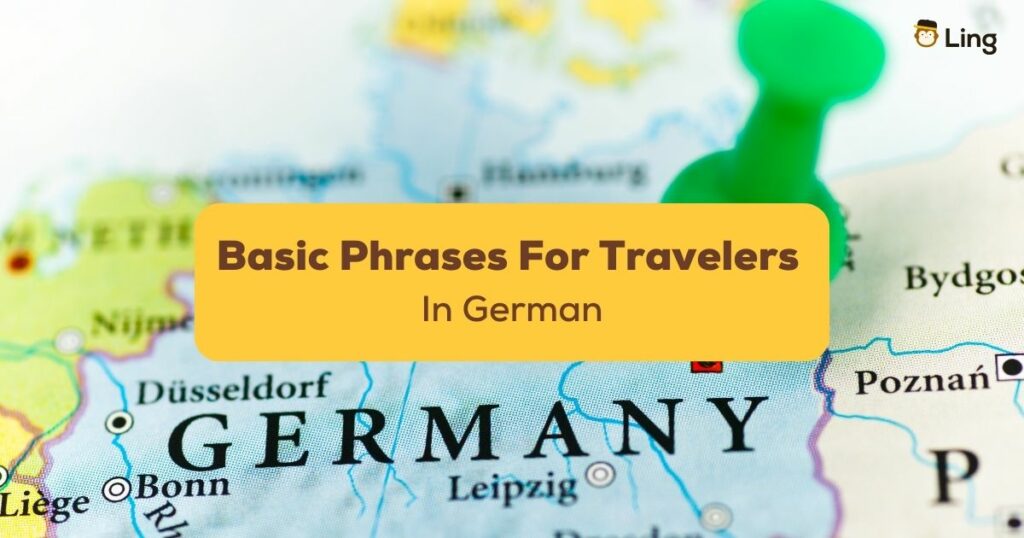
Hey there! Are you planning to explore the bustling streets of Berlin or savor the serene beauty of the Bavarian Alps? Well, knowing a handful of essential basic German phrases for travelers can transform your travel experience from “lost in translation” to “living the dream.” Language barriers can be a bit intimidating, but fear not – we’re here to sprinkle a dash of linguistic magic on your journey.
We’re diving headfirst into the wonderful world of basic German travel phrases. We’ll keep things breezy, breaking down complex language tidbits into bite-sized chunks that even your grandma would approve of. So, pack your curiosity, and let’s dive into the “wunderbar” realm of basic German words because speaking German is easier than you think!
And guess what? You won’t find any lengthy grammar lectures or tedious vocabulary lists here. Nope, just simple, practical phrases that you can whip out whenever you need to charm your way through a German-speaking situation. Get ready to sprinkle some linguistic stardust on your journey – are you excited? We sure are! Let’s dive in and unravel the magic of basic German phrases for travelers.
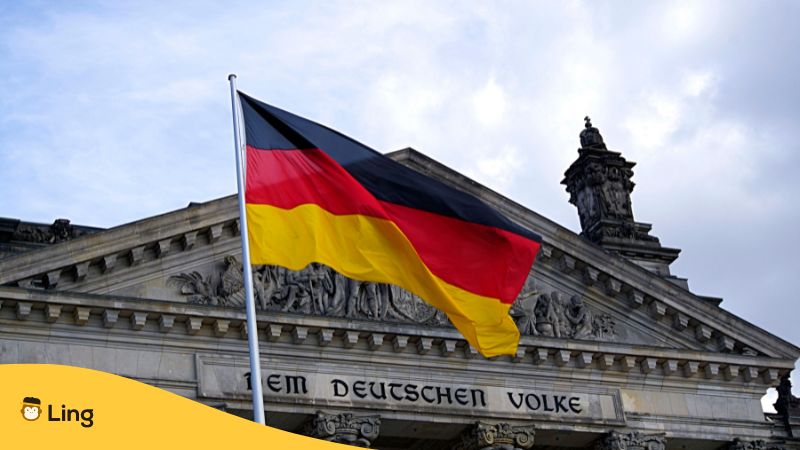
Greetings And Polite Expressions
Ah, greetings – the universal key to opening the doors of communication! In the realm of the German language, a simple “Hallo” (Hello) can work wonders. Whether you’re strolling through a bustling market or mingling at a charming café, starting with a warm “Hallo” can instantly create a friendly atmosphere.
But let’s take it a step further. Imagine impressing native German speakers with German greetings such as “Guten Tag” (Good day) or even “Guten Morgen” (Good morning). It’s like you’ve unlocked a secret code to their hearts!
Don’t worry if you’re unsure about your German skills – many Germans also speak English. So, if you find yourself in a friendly chat and want to switch to your comfort zone, you can always say, “Sprichst du Englisch?” (Do you speak English?).
Ordering Food And Drinks
Get ready to indulge your taste buds and navigate menus like a local in any German-speaking country! Whether you’re a culinary explorer or just looking to satisfy your hunger pangs, mastering a few essential words in the common language can transform your dining experience from good to “lecker” (delicious)!
Asking For Directions
Lost in a new city? No worries – we’ve got your back! When it comes to finding your way around, a few simple and essential German travel phrases can be your guiding light. Whether you’re in the heart of Munich or exploring the charming streets of Heidelberg, mastering these more common German phrases can turn your navigation game from “lost wanderer” to “exploration expert.”
So, take the time to read these words and learn German travel phrases! Let’s make your trip a memorable journey!
Shopping And Bargaining
We have some German basics to elevate your grammar when it comes to shopping! When talking to a native German speaker, try saying, “Kann ich einen Rabatt bekommen?” (Can I have a discount?)
Emergency Situations
While we hope for the best, it’s smart to be prepared with a few essential German phrases for the unexpected when traveling. Learning German phrases for emergencies can provide peace of mind and ensure you’re ready to handle any situation.
Making Friends And Socializing
When it comes to exploring new horizons, connecting with locals through common phrases can transform your journey into an unforgettable adventure. With just a sprinkle of at least the basics of common German travel phrases from your phrasebook, you’ll be well on your way to creating friendships that span cultures.
Mastering Basic German Phrases For Travelers
And there you have it – your ultimate guide to conquering the world of basic German words for travelers! Remember, you don’t need to be a language expert to make a genuine connection or travel with confidence. These basic German phrases are your stepping stones, paving the way for richer experiences and unforgettable memories. Happy travels, language enthusiast!
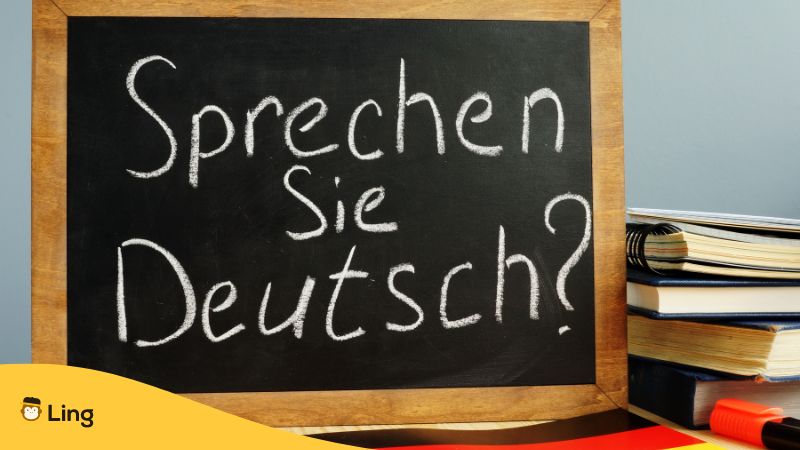
Learn German With Ling!
Ready to level up your language skills while having a blast? Look no further! Dive into the world of language learning with the Ling app. Whether you’re aiming to impress the locals on your next adventure or just want to expand your horizons, the Ling app has your back. It’s like having a language tutor in your pocket, available whenever and wherever you are.
Download the app on the App S t ore and Play Store today, and let the language-learning journey begin!
Leave a Reply Cancel reply
You must be logged in to post a comment.
Discover more

People also read

Best Armenian Sports Vocabulary: 99+ Words
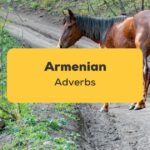
Armenian Adverbs: 30 Best Words & 10 Examples!

400+ Easy Armenian Words About Transportation
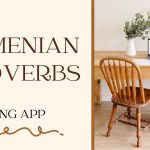
31+ Armenian Proverbs: Get Ready To be Swept Off Your Feet

30+ Amazing Words For Clothes In Armenian

Learn 7 Best Armenian Slang Words With Examples
Southeast asia, east europe.
© 2024 Simya Solutions Ltd.

Inspire Your Trip
100+ Useful Basic German Phrases for Travel

Are you planning a trip to Germany or a German speaking country? Or have you always wanted to learn German?
We have put together a guide to the most useful basic German words and phrases that will allow you pick up the basics on the language and really help you to survive visiting a German speaking country.
Do I Need to Speak German in Germany?
In the major cities and tourist destinations in Germany you will find a lot of local people can speak English, especially younger people, so visiting the country can be done without knowing any German. But not everyone does speak or understand English, especially in non-touristy locations so it is important to at least learn the basics. Also local people will appreciate if you put the effort into learning a bit of their language, even if just hello, please and thank you.
Is German a Difficult Language to Learn?
German is considered a one of the most difficult European languages to learn especially compared to French , Spanish and Portuguese. German is regarded as hard due to the long words, pronunciation, four noun case endings and three grammatical genders. But it is still a lot easier than a lot of other worldwide languages like Chinese, Japanese and Korean. Like with any language, practise really helps to improve your fluency.
Greetings in German
Here are some of the word you will probably use the most and the good news is they. are very easy to pick up.
Hello – Hallo ( learn how to say hello in other languages ) Good morning – Guten Morge Good day – Guten Tag Good evening – Guten Abend Goodbye – Auf Wiedersehen Good night – Gute Nacht See you later – Bis später
These are some of the most common words and phrases you are likely to use.
Please / You’re welcome – Bitte Thank you – Danke (here’s how to say thanks in other languages ) Yes – Ja (yah) No – Nein (nine) Excuse me – Entschuldigen Sie I’m sorry – Es tut mir leid What does that mean? – Was bedeutet das? I’m sorry – Es tut mir leid I do not know – Ich weiß nicht
Conversational Phrases in German
These are some basic German phrases when meeting people for the first time.
How are you? (formal) – Wie geht es Ihnen? How are you? (informal) – Wie geht`s? Nice to meet you – Es freut mich What’s your name? – Wie ist dein Name? My name is… – Ich heiße… I am fine – Mir geht es gut Do you speak English? – Sprechen Sie Englisch? Could you please repeat that again? – Können Sie das bitte nochmal wiederholen? I don’t speak German – Ich spreche kein Deutsch What did you say? – Was hast du gesagt? I don’t understand you – Ich verstehe Sie nicht What’s your name? (formal) – Wie heißen Sie? I’m doing well. – Mir geht’s gut Very good – Sehr gut Bad – Schlecht Where are you from? – Wo kommst du her? I am from … – Ich komme aus … USA / Canada / Australia / UK – USA / Kanada / Australien / Großbritannien Do you speak English? – Sprechen Sie Englisch? I don’t understand – Ich verstehe nicht I can’t speak German – Ich kann kein Deutsch I do not speak German very well – Ich spreche nicht gut Deutsch I’m sorry, but I do not understand – Es tut mir leid, aber ich verstehe nicht Could you say that again please? – Können Sie das bitte wiederholen? Could you say that more slowly please? – Können Sie bitte langsamer sprechen? Please write that down for me – Schreiben Sie das bitte für mich auf How old are you? – Wie alt bist du? What’s your phone number? – Wie lautet deine Telefonnumer? My phone number is… – Meine Telefonnumer lautet… Where do you work? – Wo arbeitest du? I work at… – Ich arbeite bei…
These phrases are good for when you are out and about buying things.
Supermarket – Supermarkt City center – Stadtzentrum Bank – Bank How much does that cost? – Wieviel kostet das? I would like… – Ich hätte gern… Do you have…. – Haben Sie… Rechts Excuse me, where is the – Entschuldigung, wo ist die Is it far from here? – Ist es noch weit von hier
Food & Drink
These phrases are perfect for visiting restaurants and ordering food.
A table for two, bitte – Einen Tisch für zwei, please We have a reservation – Wir haben eine Reservierung The menu, please – Die Speisekarte, bitte Can you recommend something? – Können Sie etwas empfehlen? What is this? – Was ist das? I would like – Ich hätte gerne Steak with fries – Steak mit Pommes Do you have a vegan meal? – Haben Sie ein veganes Gericht? Another glass of water, please – Noch ein Glas Wasser, bitte Enjoy your meal – Guten Appetit What is your favorite food? – Was ist dein Lieblingsessen? My favorite food is… – Ich esse am liebsten… The check, please – Die Rechnung, bitte Cheers! – Prost! Where is the bathroom? – Wo ist die Toilette
Hotels & Accommodation
We have a reservation – Wir haben eine Reservierung Do you have free rooms available? – Haben Sie noch freie Zimmer? How much is a room per night? – Wie viel kostet ein Zimmer pro Nacht? I would like to reserve a room – Ich möchte ein Zimmer reservieren Is the breakfast inclusive? – Ist das Frühstück inklusive? Room service – Zimmerservice What time is the check out? – Wie viel uhr ist check-out?
Transport & Directions
These are the most common German travel phrases related to getting around, These are some of the most important words and phrases to have:
Where? – Wo? Left / Right – Links / Rechts Entrance and Exit – Eingang and Ausgang In which direction can I find … ? – In welcher Richtung finde ich … ? Bus – Bus Subway – Metro Gas station – Tankstelle Train station – Bahnhof The airport – Flughafen North / South / West / East – Norden / Süden / Westen / Osten Upstairs / Downstairs – Oben / Unte Can I get there on foot? – Kann ich dorthin zu Fuß laufen? You have to turn left / right. Which underground or bus do I have to take? – Welche Straßenbahn, Metro oder Bus muss ich nehmen? Airport – Flughafen Train station, please – Bahnhof, bitte Is it close to … ? – Ist es in der Nähe von … ? Around the corner – Um die Ecke Where is the exit / entrance? – Wo ist der Ausgang / Eingang? Stop here, please – Halten Sie hier an, bitte. Where is the station? – Wo ist die Haltestelle? Where can I buy a ticket? – Wo kann ich eine Fahrkarte kaufen? Is this train / bus going to … ? – Fährt dieser Zug / Bus nach … ? Can you show me on the map? – Können Sie es mir auf der Karte zeigen? Do I have to change? – Muss ich umsteigen?
Emergencies
Here are some useful phrases to use if you find yourself in a difficult situation:
Could you please translate this for me? – Können Sie das bitte übersetzen? Help! – Hilfe! Police – Polizei Ambulance – Ambulanz Hospital – Krankenhaus
German Numbers
One – Eins Two – Zwei Three – Drei Four – Vier Five – Fünf Six – Sechs Seven – Sieben Eight – Acht Nine – Neun Ten – Zehn Eleven – Elf Twelve – Zwölf Thirteen – Dreizehn Fourteen – Vierzehn Fifteen – Fünfzehn – Sixteen – Sechzehn Seventeen – Siebzehn Eighteen – Achtzehn Nineteen – Neunzehn Twenty – Zwanzig Thirty – Dreißig Forty – Vierzig Fifty – Fünfzig Sixty – Sechzig Seventy – Siebzig Eighty – Achtzig Ninety – Neunzig One hundred – Hundert Two hundred and fifty – Zweihundertfünfzig Five hundred – Fünfhundert One thousand – Tausend
Days of the Week in German
Monday – Montag Tuesday – Dienstag Wednesday – Mittwoch Thursday – Donnertag Friday – Freitag Saturday – Samstag Sunday – Sonntag
Months of the Year in German
January – Januar February – Februar March – März April – April May – Mai June – Juni July – Juli August – August September – September October – Oktober November – November December – Dezember
We hope our list of the best German travel phrases for tourists and travelers has been useful to you. You could download the article as a PDF and print it out, or write down some of the most important ones.
Share this:
- Click to share on Facebook (Opens in new window)
- Click to share on Twitter (Opens in new window)
- Click to share on Pinterest (Opens in new window)
- Click to share on Tumblr (Opens in new window)
- Click to share on Reddit (Opens in new window)
- Click to share on Pocket (Opens in new window)
- Click to share on WhatsApp (Opens in new window)
Recommended Articles

The Best Vegan & Vegetarian Restaurants in Moscow

Exploring Scotland: Unforgettable Road Trips


Top 3 Things to Do in Windermere with Kids
Privacy Policy

Guide to German Travel Phrases for Tourists and Travelers

When you’re traveling outside of your home country, there’s a very good chance that you won’t speak the language of that country. For that reason, it can be really helpful to learn some basic German travel phrases before going to Germany, Austria, or even parts of Switzerland, Belgium, and Luxemburg.
In this article, we’ll provide you with German phrases for tourists that will help you survive basic daily situations.
For instance, when traveling to the center of Europe, you’ll probably have to take a train at some point. (And if you don’t have to take one, we suggest you take one anyway. This experience is part of traveling to Germany.)
Once you’ve bought your ticket at Deutsche Bahn (the German railway company) and you’re ready to discover a new city, the conductor may want to see your ticket or ask some questions. If you didn’t know, even though this is an international company, their staff isn’t one-hundred percent trained to speak English. Trust us, you don’t want to come into this situation unprepared. You’ll need to know phrases for travelers in German.
But no worries. To prevent you from this embarrassing situation, we have free courses for beginner , intermediate , and advanced students. You can even find free bonus material on our website.
Without a lot of hustle and bustle, let’s just get straight to it. Here are the most useful German phrases for travelers.
Table of Contents
- Why Should You Learn German?
- German Pronunciation Specialities
- Basic Questions and Their Perfect Answers
- Restaurants and Ordering Food
- At the Hotel
- Locations and Transportation
- Working Through Communication Barriers
- How GermanPod101 Can Help You Master Urgent Travel Situations

1. Why Should You Learn German?

We know that learning another language can be frustrating and hard, and this may be more true of German than some other languages. But here are some facts that should convince you to learn German:
- Studying in Germany is free – While you have to pay for a college education in most countries, studying in Germany is free of charge.
- Germany is Export King – Germany is the country with the biggest export market in Europe , and the third biggest worldwide.
- Easy for native English speakers – English and German belong to the same language family , which makes it easy to learn (and vice versa).
- Startup hotspot – The startup scene is growing rapidly in the cities of Berlin, Munich, Cologne, and Hamburg.
Knowing even just the basic German travel phrases for beginners can greatly help you make the most of your time in Germany.
2. German Pronunciation Specialities

Before we move on to learning German phrases for travelers, you should have a little information on German pronunciation specialties.
As already mentioned, German is really close to the English language, which makes it easy for good English speakers to adapt to German. But there are some combinations that require special effort in terms of pronunciation. On the left, you see the letter combination; on the right, an English equivalent to that sound.
3. Greetings

Now, onto the most basic German words and phrases for travellers: Greetings. These are the most common German travel phrases, and always important to have at the ready.
- Hallo! Hello!
- Guten Morgen! Good morning!
- Guten Tag! Good day!
- Guten Abend. Good evening!
- Bitte. Please.
- Danke. Thanks. / Thank you.
- Tschüss. Bye.
- Auf Wiedersehen. Goodbye.
- Ich heiße … My name is …
- Ich bin in Deutschland für … Wochen. I am in Germany for … weeks.
- Ich komme aus … I am from …
- Wie geht’s? How are you?
- Mir geht es gut. I am fine.
4. Basic Questions and Their Perfect Answers

To help you out with the pronunciation and some practice for these questions, you can find a free lesson on our website . Also feel free to click on the links in the chart; they’ll take you to relevant German vocabulary lists on our site to help you answer the questions yourself!
5. Restaurants and Ordering Food
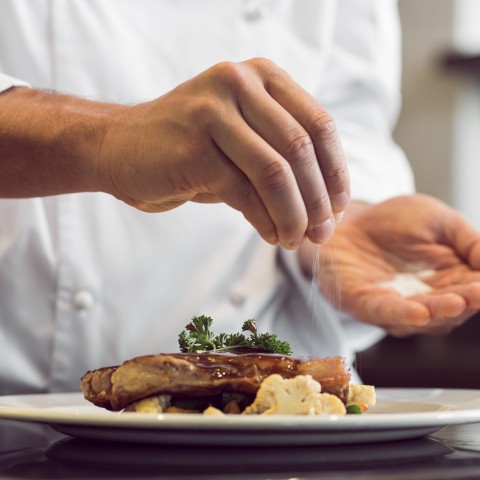
- Einen Tisch für zwei/drei/vier Personen, bitte. A table for two/three/four persons, please.
- Wir haben eine Reservierung. We have a reservation.
- Die Speisekarte, bitte. The menu, please.
- Ich hätte gerne das Steak mit Pommes. I would like the steak with fries.
- Haben Sie ein veganes Gericht? Do you have a vegan meal?
- Können Sie etwas empfehlen? Can you recommend something?
- Noch ein Glas Wasser, bitte. Another glass of water, please.
- Getrennt oder zusammen? Together or separately?
- Guten Appetit. Enjoy your meal.
- Die Rechnung, bitte. The check, please.
We have a complete vocabulary list for you, with words for the restaurant.
6. At the Hotel
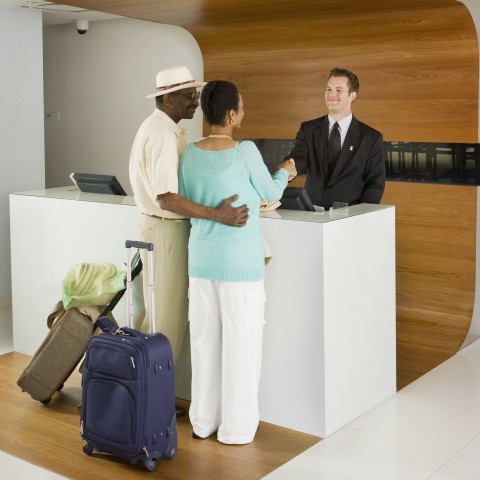
- Haben Sie noch freie Zimmer? Do you have free rooms available?
- Wie viel kostet ein Zimmer pro Nacht? How much is a room per night?
- Ich möchte ein Zimmer reservieren. I would like to reserve a room.
- Ist das Frühstück inklusive? Is the breakfast inclusive?
- Zimmerservice. Room service.
- Um wie viel Uhr ist Check-Out? At what time is the check out?
7. Locations and Transportation

1- Asking for and Giving Directions
2- transportation.
- Wo ist die Haltestelle? Where is the station?
- Wo kann ich eine Fahrkarte kaufen? Where can I buy a ticket?
- Fährt dieser Zug / Bus nach … ? Is this train / bus going to … ?
- Können Sie es mir auf der Karte zeigen? Can you show me on the map?
- Muss ich umsteigen? Do I have to change?
Again, we’ve prepared for you a free vocabulary list with words that you can use when asking for directions and locations.
8. Working Through Communication Barriers
Just in case you don’t know what to say or you didn’t understand anything someone just said to you, here are some phrases that can get you out of this sticky situation:
- Sprechen Sie Englisch? Do you speak English?
- Können Sie das bitte nochmal wiederholen? Could you please repeat that again?
- Ich spreche kein Deutsch. I don’t speak German.
- Ich verstehe Sie nicht. I don’t understand you.
- Können Sie das bitte übersetzen? Could you please translate this for me?
- Hilfe! Help!
Maybe you’re asking yourself if you can go to Germany without speaking any German. Sure you can, you can live there even without speaking the language.
Getting along as a tourist with just English will be more than easy for you. Everybody knows at least the basics of English. And as long as they can see that you’re patient, they’ll be patient with you.
9. How GermanPod101 Can Help You Master Urgent Travel Situations
In this article, we showed you the most helpful phrases that you can use on your travels. We covered some basic pronunciation specialities of the German language, greetings, numbers, situations in a restaurant and hotel, and asking for directions.
While you can survive traveling Germany with only English, Germans will be really grateful when they see that you’re trying to speak their language. We know that German is a hard language, but to see someone trying makes us happy.
This article was just the beginning; take a look at our free resources . But if you really want to get to it and become a good German speaker, then we can offer you a private teacher to help you learn based on your needs and goals with the German language.
Before you go, let us know in the comments how you feel about using the useful German travel phrases outlined in this article. Feel free to reach out with questions in the comments below, and know that the more you practice and use these essential German travel phrases, the easier it will become.
Or sign up using Facebook
Got an account? Sign in here

How To Say ‘Thank you’ in German

Hi, What’s Up, and Beyond: How to Say Hello In German

How to Say I Love You in German – Romantic Word List

The 5 Go-To German Podcasts for Language Learners

Intermediate German Words to Level Up Your Vocab

German Animal Names: The Ultimate Vocabulary List
How to celebrate april fools’ day in german.
- Forum Spotlight
- Scheduled Maintenance
- German Holidays
- German Dictionary
- German Language
- German Translation
- German: one word at a time
- Guest Bloggers
- Advanced German
- German Alphabet
- German Grammar
- German Lessons
- German Online
- German Phrases
- German Podcasts
- German Words
- Tips & Techniques
- Life in Germany
- Living in Germany
- Media Coverage
- News in German-speaking countries
- Feature Spotlight
- Speak German
- Success Stories
- Teaching German
- Team GermanPod101
- Uncategorized
- Word of the Day
- Immigration, Visas
Copyright © 2024 Innovative Language Learning. All rights reserved. GermanPod101.com Privacy Policy | Terms of Use . This site is protected by reCAPTCHA and the Google Privacy Policy and Terms of Service apply.
- Search Please fill out this field.
- Newsletters
- More to Explore
Basic German Words and Phrases for Travelers
Most Germans speak English very well, especially younger people in the bigger cities, so you're unlikely to have any difficulties getting around this diverse country. Still, a little German can go a long way. The language has a rich history and is the third most widely taught foreign language in the U.S. In short, it is a useful language to know in general.
Try it when dining out , traveling by train, or even partaking in Oktoberfest. Start your first lesson of Deutsch here, and learn basic German phrases and words that will be helpful for you in any situation. You'll find the pronunciation in parentheses. Read the words out loud—the capitalized part should be emphasized.
Basic German Words and Phrases Every Traveler Should Know
- Yes – Ja (yah)
- No – Nein (nine)
- Thank you – Danke ( DAHN-kuh)
- Please and You're welcome - Bitte (BITT-uh)
- Excuse me - Entschuldigen Sie (ent-SHOOL-degen see)
- I'm sorry - Es tut mir leid (ehs toot meer lite)
- Where? - Wo? (Vo?)
- Where's the restroom? - Wo ist die Toilette? (vo ist dee toy-LET-uh)
- Left / Right - Links / Rechts (linx / rechts)
- Do you have.... - Haben Sie... (Haaben ze...)
- Entrance and Exit - Eingang and Ausgang (Eyen-Gong and Ow-S-Gang)
- Men and Women - Herren/Männer and Damen/Frauen (Hair-en/Menner and Dom-en/FR-ow-en)
Dialects in Germany
For a mid-size country, Germany has a very diverse set of dialects. Linguists say there are as many as 250 distinct German dialects.
These get even more pronounced in places like Austria and German-speaking Switzerland. Vocabulary, accent, and phrases vary wildly and some native German speakers can't even understand people from different regions. However, everyone learns Hochdeutsch (high German) and should be able to communicate by using these uniform words and pronunciation.
For example, the pronunciation of "Ich" ("I") depends on dialect. In general, the sound is harder like "Ikh" in the south , while it is softer like "Ish" in the north, particularly in Berlin. However, there are many exceptions. We have used the softer "Ish" pronunciation in this guide.
German Greetings
- Hello/Good day - Guten Tag (GOOT-en tahk)
- Good morning - Guten Morgen (GOO-ten MOR-gen)
- Good evening – Guten Abend (GOO-ten AH-bent)
- Good night - Gute Nacht (GOO-tuh nahdt)
- Good bye – Auf Wiedersehen (Ouf VEE-der-zane)
- See you later - Bis später (Biss Sch-PAY-ter)
- Informal Good-Bye - Tschüß (t-ch-uice)
German Small Talk
- My name is - Mein Name ist.... (Mine NAH-muh ist...)
- What's your name? (formal) - Wie heißen Sie? (vee hie-ssen zee)
- Nice to meet you – Es freut mich. (As froit mish)
- How are you? (formal) - Wie geht es Ihnen? (vee gayt es ee-nen)
- How are you? (informal) - Wie geht`s? (wee gates)
- (Very) Good - ( Sehr ) Gut ( zair goot ) / Bad - Schlecht (shlekht)
- I’m doing well. - Mir geht’s gut. (MIR gates GOOt)
- Do you speak English? (informal) - Sprichst du englisch? (shprikhst doo eng-lish)
- I would like… - Ich hätte gern… (Ish het-a Gar-en)
- I am from…[the USA/Canada/Australia/UK]. - Ich komme aus…(den USA/Kanada/Australien/Großbritannien)
- Do you speak English? - Sprechen Sie Englisch? (SPRA-shun see ANG-lish)
- I don't understand - Ich verstehe nicht (Ish VARE-stahe nisht)
- I can't speak German – Ich kann kein Deutsch. (Ish kun kine doitsh)
- How much does that cost? - Wieviel kostet das? (Vee-veal cost-it DAs?)
- Cheers! - Prost! (PRO-st)
- Have a good trip! - Gute Reise! ( GOOta Rise-a)
Regional German
Northern germany.
- Hi (informal) - Moin (Moi’n) Can also be used to ask if someone is doing well— moin ?—and answered with good! good! ( Moin ! Moin !)
- Good - Jut (YOU-t)
Southern Germany
- Hello/Good-bye - Servus! (Sir-VUS)
- Hello (formal) - Grüß Gott or S'Gott (GRu-S GOT)
- May god protect you (informal good-bye) - Behüte dich/euch ( Gott ) (Ba-Hewta DICK)
- Yes! (strong) - Jawohl (Yeah VULL)
German Numbers
- Three - Drei
- Four - Vier
- Five - Fünf
- Six - Sechs
- Seven - Sieben
- Eight - Acht
- Nine - Neun
- Eleven - Elf
- Twelve - Zwölf
Days of the Week in German
- Monday - Montag
- Tuesday - Dienstag
- Wednesday - Mittwoch
- Thursday - Donnertag
- Friday - Freitag
- Saturday - Samstag
- Sunday - Sonntag
Months in German
- January - Januar
- February - Februar
- March - März
- April - April
- June - Juni
- July - Juli
- August - August
- September - September
- October - Oktober
- November - November
- December - Dezember
Related Articles
More related articles.

Home » 29 Common German phrases you’ll need on your travels
29 Common German phrases you'll need on your travels
Pack your socks and sandals, and hold on to your Bretzel. We’re going to Germany – the land of beer and sausages!
Whether you’ve booked a trip to go to the Oktoberfest in Munich, the carnival in Cologne, or just a nice, relaxing hiking trip around the Black Forest, knowing how to get by in Germany will make your stay much more enjoyable.
We’ve gathered the most essential, basic German words and phrases that’ll help you get by on your travels.
From saying hi to ordering Bratwurst – here are 29 common German travel phrases for your travels
10 common german phrases.
From basic German greetings to pleas for help when you get stuck, we’ve got you covered.
- Hallo (Hello)
- Tschüss (Bye)
- Bitte (Please)
- Danke (Thanks)
- Entschuldigung (Excuse me)
- Sorry (Sorry)
- Formal: Können Sie mir helfen?; informal: Kannst du mir helfen? (Can you help me?)
- Formal: Sprechen Sie English?; informal: In Sprichst du Englisch? (Do you speak English?)
- Einen Moment, bitte. (One moment, please.)
- Das ist alles, danke. (That’s all, thank you.)
Want to learn more German phrases?
Enrich your German vocabulary and unlock a world of phrases beyond “Hallo!” with Busuu’s free expert-designed online courses. Join our 120 million+ native speaker community, and access a treasure trove of language learning resources.

Danke, I will
6 phrases for getting around .
Try these phrases out when Google Maps (or the paper version, if you’re that retro!) lets you down.
- Wo finde ich… (Where do I find… ) … den Bahnhof? (… the train station?) … einen Geldautomaten? (… a cash machine?) … die Touristeninformation? (… the tourist information?) … ein Taxi? (… a cab?) … eine Toilette? (… a toilet?)
- Darf ich bitte vorbei? (Could you let me pass please?)
- Wie viel kostet das? (How much does this cost?)
- Wann fährt… (When’s… ) … der nächste Bus? (… the next bus?) … die nächste Bahn? (… the next train?)
- Ich habe mich verlaufen. (I’m lost.)
- Wie komme ich zu… (How do I get to… )
7 Common German phrases for eating out
Wining and dining out on the town? Whip out this list to hold your own in any German restaurant.
- Ich habe eine Reservierung auf den Namen… (I’ve got a reservation under… )
- Ich möchte bitte… (I would like… ) … einen Tisch reservieren. (… to book a table, please.) … ein Glas Wein. (… a glass of wine, please.) … die Speisekarte. (… the menu.) … zahlen.(… to pay, please.)
- Kann ich mit EC-Karte / Kreditkarte zahlen? (Do you take debit cards / credit cards?)
- Zum Wohl! / Prost! (Cheers!)
- Guten Appetit. (Enjoy your meal.)
- Die Rechnung, bitte. (The bill, please.)
- Stimmt so. (Keep the change.)
Top tip: The service at restaurants or cafes usually isn’t included in the bill. Tipping is welcomed and should reflect how happy you were with food and service – 10% of the bill is the norm.
@busuu Do you know any more? 🇩🇪 #german #germanlesson #learngerman #germanwords #edutok #languagelearning #busuu ♬ Reason – XO TEAM
6 German sentences for talking about your travels
You never know who you might meet on your travels… open yourself up to meeting new people with these basic German conversation-starters.
- Ich heiße… (My name is… )
- Ich komme aus… (I’m from… ) … Großbritannien (… the UK.) … den Staaten (… the States.) … Australien. (… Australia.)
- Ich habe… (I have…) … ein Zimmer reserviert. (… booked a room.)
- Ich bin zum ersten Mal hier. (This is my first time here.)
- Ich bleibe für… (I’m staying for… ) … das Wochenende (… the weekend.) … ein paar Tage. (… a few days.) … eine Woche. (… a week.)
- Ich fahre weiter nach… (I’m travelling on to… )
Did you know this? Besides hip places like urban Berlin, it’s still most common to approach people you don’t know with the polite Sie instead of the personal du , which we use with friends, family or children. Though if you’ve been chatting with someone for a while, they might ask if you want to use the informal du – especially after you’ve been trying all these new phrases out on them. They might ask: Wollen wir uns duzen? (Should we use “du”?) Of course, you’ll want to say: Ja!
That’s all from us! Just one last thing: remember that being able to communicate always also means being able to connect.
Knowing the local lingo is not only useful for navigating around unfamiliar places. Speaking German will also open many cultural doors for you. Even if it’s just a friendly danke (thanks), you’ll have shown you’ve made an effort.
And who knows? You might even make a German smile!
Inspired by this post?
Learn more common German phrases – or common phrases in 13 other languages – with Busuu, the app that makes learning a language easier for everyone.
Start learning for free
We think you might also like…
- The best way to learn German at home
- Is German hard to learn? An honest guide
- 11 English words that are actually German
- How to say hello in German like a native speaker
- Colors in German: name & pronounce all the popular colors
- French vs German? 5 key factors to decide which you should learn
Anna Klappenbach
Learn a language, learn a new language, learn languages online.
Learn Spanish online Learn Japanese online Learn French online Learn English online Learn German online Learn Dutch online Learn Italian online Learn Portuguese online Learn Chinese online Learn Polish online Learn Turkish online Learn Russian online Learn Arabic online Learn Korean online
About Busuu Careers Press Partner with Busuu COVID-19
Discover Busuu
How Busuu works Busuu Premium plans Busuu for Business Download Busuu Redeem a voucher Busuu Blog Busuu Student Discount
Customer support
Contact us FAQs
© 2008 – 2023 Busuu Ltd. All rights reserved.

German Travel Phrases With Pronunciation
Before heading off on a holiday, perhaps to a land filled with pretzels and techno clubs, it may come in handy to download some useful German travel phrases onto your brain, along with the “Hot Girl Summer” song you may have already downloaded onto your phone.

German travel phrases are useful for tourists and can help you show a little respect for local German culture. In this post, we're going to look at useful German words & expressions you can use on your holiday here.
Basic German Travel Phrases
We're going to start out with very common German travel phrases and later in the post look at some more advanced expressions you might want to use on your trip. All travel phrases come with audio recordings, so just click on the play button to listen to the pronunciation. 😊
Common German Travel Phrases
Let's start with the absolute basics of German. If you don't have much time left and want to make sure you can at least say Hello , Goodbye and yes in German, have an intense stare at this list:
Introducing Yourself
If you want to introduce yourself in German or have a little bit of small talk , whether it be at a café or at the airport, you might like the following phrases. When using these phrases, make sure that your name is Tom.
If you would like to learn how to talk about yourself more, the first lesson of our free online German lessons is about how to introduce yourself in German .
Locations in German
Phrases for the airport, ordering at restaurants & cafés, travel phrases for the hotel, getting around in german, advanced german travel phrases & idioms.
Now, if you are an intermediate learner, you might not have to learn simple phrases like “Ein Bier bitte” and “Guten Tag” anymore. The phrases in the following list will provide you with helpful building blocks you may use to form more advanced, eloquent sentences about your trip, in German, whilst you tuck into your Spaghettieis.
1. Der Geheimtipp
Have you ever been on holiday and found a restaurant or a sight that is little known, but absolutely amazing? If so, you found a Geheimtipp.
A Geheimtipp is a quality place that has a certain charm in part because it isn’t filled with tourists. The reason for this is because it isn’t so well known; as if the locals have been keeping it a secret from the crowds of tourists.
2. Die Touristenfalle
When on holiday, you may come across certain low-quality tourist attractions and services that are meant to entice those looking for a quick and easy-to-find place to go, in order to pass the time. They may be mediocre and tacky, and are often overpriced.
When you go to such a place, you may even leave feeling like you were given a superficial impression of the culture, and may have noticed that the place was full of tourists, with no locals in sight. Some people enjoy the convenience of such places, but for those who don’t, they can be referred to as: tourist traps.
So, next time you’re on holiday, you might find it useful to remember this term.
PS: Das Beispiel ist ein echter Tipp. Die haben sehr leckere Baumstriezel.
3. In der Umgebung
Sometimes it can be useful to ask around for Geheimtipps in the area you are staying. Die Umgebung is the Kreis district or Bereich area in which one is staying. If you know the whereabouts of some hidden gems in the area, you can kill two birds with one stone by visiting interesting, quality places, without having to travel around the city all day. Or, perhaps for those who do love to explore all the far corners of a given travel destination, it may be enough to just know which little cafe in the area one may visit every morning, for a reliable cup of coffee.
Either way, it may come in handy to remember the phrase: In der Umgebung .
4. sich nach etw. erkundigen
It’s always a good idea to plan ahead of your holiday ☝️; to seek any information that may be useful to you on your trip. Sich nach etw. erkundigen means just this - to seek information / to ask about something, looking for helpful information.
For example, you may have booked a dinner on the beach during your holiday, but would like to ask for more information regarding the exact location. Or, you may have booked your hotel but would like to ask if they offer specific food at the breakfast buffet. To ask for this information, you could say:
5. keine Sekunde vergeuden
Some people love to make the most out of the time they have on holiday. They wake up early, maybe as early as the sun rises, to double check their plan for the day, packed with a number of activities to do and sights to see.
First there’ll be a morning hike through the mountains, before a tour of the city, then a quick train ride to a cheese tasting in the countryside, then back to the city for a dinner that was booked weeks in advance, and a night of dancing at an edgy fetish party held in a medieval castle.
Do you know someone like this? In any case, not a minute should be wasted!
6. etw. durchplanen / etw. bis ins letzte Detail planen
For those who love to plan every detail of their holiday, the phrase “etw. bis ins letzte Detail planen” may come in handy.
There are some holiday destinations that are full of fascinating things to explore and experience. For example, Berlin has an abundance of quality clubs, spas and museums to offer. So, in order to fit in as much as you can in a short amount of time, one might like to plan ahead and get organized.
7. es sich gut gehen lassen
Whilst some people love to make the most out of their holiday by filling it with activities, others are perfectly content with lots of relaxation and restoration.
This may be done by booking a relaxing holiday by the sea, or retreating into nature by spending your trip in a cabin in the woods. What’s important here is the idea of just letting go, or to: sich gut gehen lassen .
8. auf gut Glück
Sometimes, some people enjoy keeping holiday planning to a bare minimum, as in not planning much at all and letting each day bring new, spontaneous adventures.
For example, you may book a flight to a remote destination you’ve never visited before, just like that. No plan. No wishlist. Just your passport and, hopefully, the eyes of god watching over you. Whether it’s a whole holiday left unplanned, or perhaps just a day to see where your mood takes you, a helpful expression to describe this intentional spontaneity is: auf gut Glück .
9. jdn. auf die Folter spannen
Have you ever booked a holiday for your partner or friend, but didn’t tell them the destination until the day you took your flight?
Or have you ever planned a special day, or activity during a trip abroad, that your partner or friend knew about except for some really important details, like where the event is being held, or what type of food to expect?
If you have, then you have kept someone waiting in suspense , or you intend to excite somebody by purposefully hiding details about your plan. There is a phrase in German that expresses this: jdn. auf die Folter spannen .
10. Urlaub auf Balkonien machen
This phrase is for those of us who, once in a while, enjoy a good holiday spent in the comfort of our own home… or, yes, balconies.
As this phrase quite literally suggests, “Urlaub auf Balkonien machen”, means to relax and enjoy what one has to offer at home already, rather than to travel somewhere else.
So, for example, many people, perhaps against their wishes, would have spent their recent holidays in "Balkonien", due to the Corona restrictions. Many people living in Berlin also enjoy their holidays in "Balkonien" over the summer, as the city is arguably most alive during this season.
Leave a comment & let us know what you think, or what other materials you might find helpful.
Explore Our Podcast
Explore our intermediate podcast about contemporary German culture, history, philosophy & more. Each episode is spoken at a slow pace, and includes a transcript.

11 essential German phrases to memorise for your trip
Recently updated on July 6th, 2023 at 09:40 am
Exploring the fairy-tale Neuschwanstein Castle. Walking along the remnants of the graffiti-covered Berlin Wall. Sipping Bavaria’s rich beer-brewing heritage. Admiring beautiful Baroque architecture in Dresden. No matter where you are travelling in Germany, knowing some essential German phrases can help your trip run smoother – and make a good impression on the locals too.
Savvy travellers will probably already know basic German words, and they’re pretty easy to pick up if you don’t. Try hallo (hello), guten tag (good day), auf wiedersehen (goodbye), danke (thank you), bitte (please), ja (yes) and nein (no). And having a few numbers under your belt – eins (one), zwei (two), drei (three) – should come in handy when buying tickets. Or beer, of course.
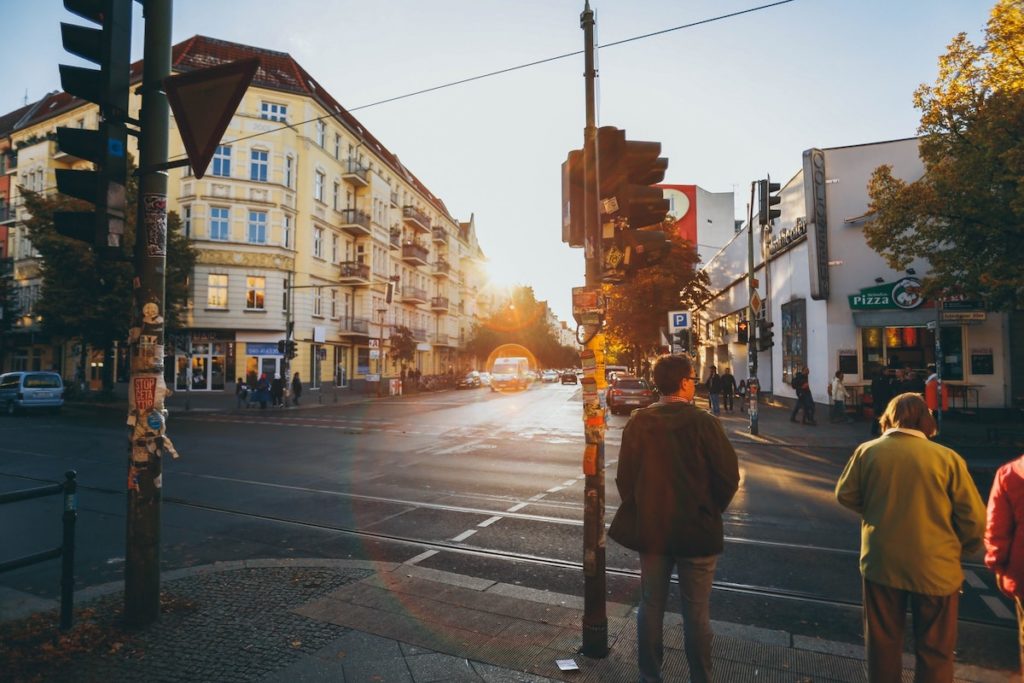
Taking you (a little) beyond the basic German words you need to know, we’ve pulled together some essential German phrases that are incredibly useful for travellers to have in their back pocket. Best of all, if you learn these you’ll be all set for trips to Austria and Switzerland too. Win, win, win. GET INSPIRED BY: Best of Germany
Wie geht’s?
Few things immerse you in a destination quite like striking up a conversation with locals. Asking “how are you?” is a brilliant way to start. If they ask back, you can reply “ mir geht’s gut ”, meaning “I am fine”. And if the conversation’s going really well, why not introduce yourself? Simply say “ Ich heiße… ” (I am called…) before your name, and ask “ Wie heißt du? ” to find out someone else’s.
Remember: when you come across the ß (called an eszett, a character unique to the German language), simply pronounce it like “s”, as you would in the English “see”.
Entschuldigung
No matter what language you’re speaking, it’s good to have good manners. Just say “ entschuldigung ” (excuse me) to get the attention of hotel receptionists, ticket officers and waiters, or perhaps people who might look like they know the directions you need. Incorporate this into a longer sentence “Entschuldigen sie, ist dies… ?” (excuse me, is this…?) when you’re on public transport and unsure where to get off.
RELATED CONTENT: Germany Destination Guide

Where is…? An essential phrase for explorers. Simply add the name of your intended destination to the end. If you’re in Berlin, for instance, that could be the Brandenburger Tor (Brandenburg Gate), Berliner Fernsehturm (Berlin Television Tower) or Museumsinsel (Museum Island). More common places include the “ Bahnhof” (train station), “Flughafen” (airport), “ stadtzentrum ” (city centre) and “ supermarkt ” (supermarket). Helpfully, “taxi” and “bank” are the same in German and English.
In this case, asking “ zeigen sie mir das bitte auf der Karte? ” (can you show me on the map?) can be a more foolproof way of getting where you want to go. RELATED CONTENT: 5 hidden gems of Germany
Einmal nach… bitte
Germany’s public transport is among the world’s best, and a handful of basic german phrases can help you navigate the various transport systems. To ask for a ticket: “Einmal/ zweimal nach… bitte”, meaning “one ticket/ two tickets to (your destination) please”. Follow up with “ was kostet das?” (how much is it?) and “ wann fährt er ab?” (when does it leave?) and you’ll get from A to B in no time. (Hopefully.)
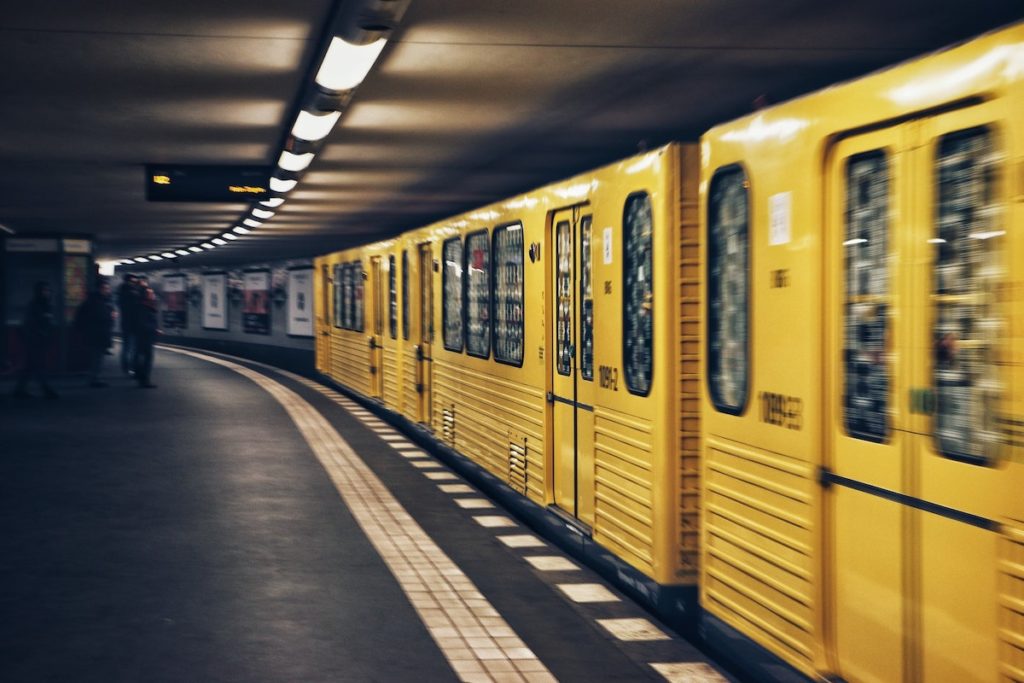
Ich hätte gerne…
Tucking into the culinary culture of a country is one of the best ways to get a real taste of your destination. Instead of just smiling and pointing at the menu – ask “ kann ich bitte die Speisekarte haben? (can I have the menu, please?) if you don’t already have one – simply add “ Ich hätte gerne ” (I would like) before the name of your preferred food, be it bratwurst (sausage), spätzle (egg noodles), kartoffelkloesse (potato dumplings) or schweininshaxe , a slow-roasted pork knuckle – best enjoyed with a local beer on the side. Sehr lekker! (Very tasty!)
Can’t decide what to order? Ask: “ Was empfehlen sie? ” (what do you recommend?). GET INSPIRED BY: Imperial Europe
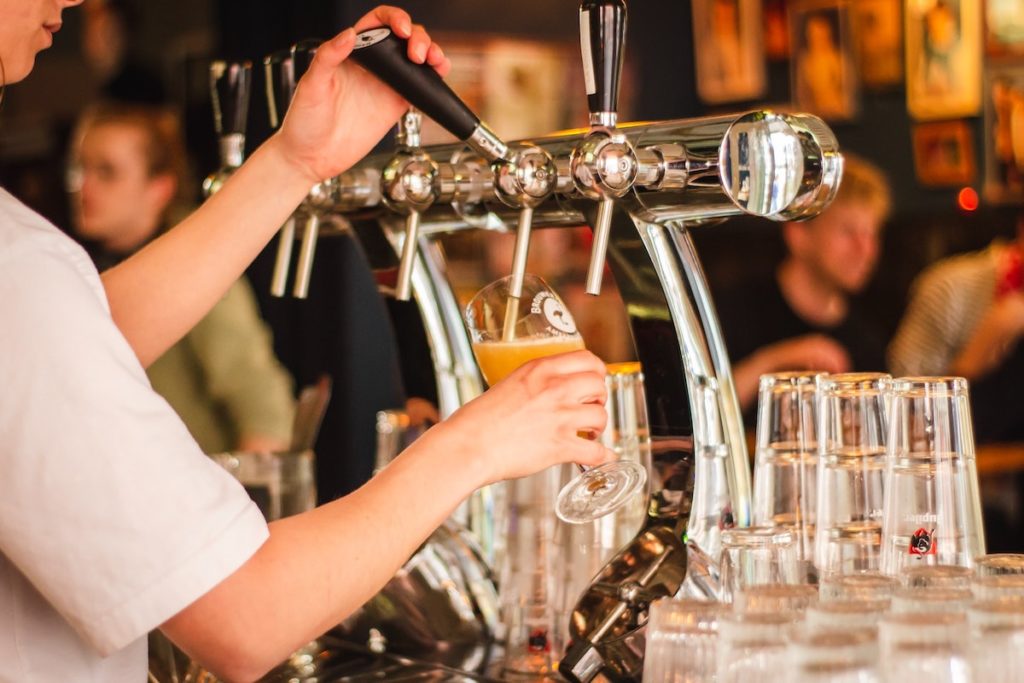
As the world’s largest beer festival, Oktoberfest is a huge draw for travellers and locals every autumn (usually late Steptember or early October), but beer is a big part of German culture year-round. These are some German words you need to know: “ Prost! ” (cheers!); “ maß ”, a litre glass jug of beer; and “ Eins, Zwei, Drei, G’suffa!” , meaning “one, two, three, drink!”. You’ll probably want a few brezeln (pretzels) to soak up all that beer too.
This is a time when traditional clothing comes out the wardrobe. Expect to see the dirndl , a peasant-style pinafore, and lederhosen , leather trousers or shorts – or perhaps even get some to wear yourself. RELATED CONTENT: Iconic Germany: 8 of the most incredible German sights
Ich esse kein(e)…
A less fun entry on this list, but necessary for any traveller with special dietary requirements. “ Ich esse kein(e)…” translates as “I don’t eat… “. Follow up with “ nüsse” (nuts), “ milchproductke” (dairy) or “ fleisch” (meat) as appropriate. “Gluten” is the same as in English, and you can explain that you are “ vegetarier(in)” (vegetarian, adding the ‘in’ for female), “veganerin vegan or have “ die Zöliakie ” (coeliac disease).
Die Rechnung, bitte
The bill, please. An essential ending to any meal. “Kann ich zahlen ?” (can I pay?) is a less formal way of asking. And “ Entschldigung, wo ist die Toilette ” (Excuse me, where is the toilet?) might also come in handy after all those beers. GET INSPIRED BY: Best of Germany and Austria
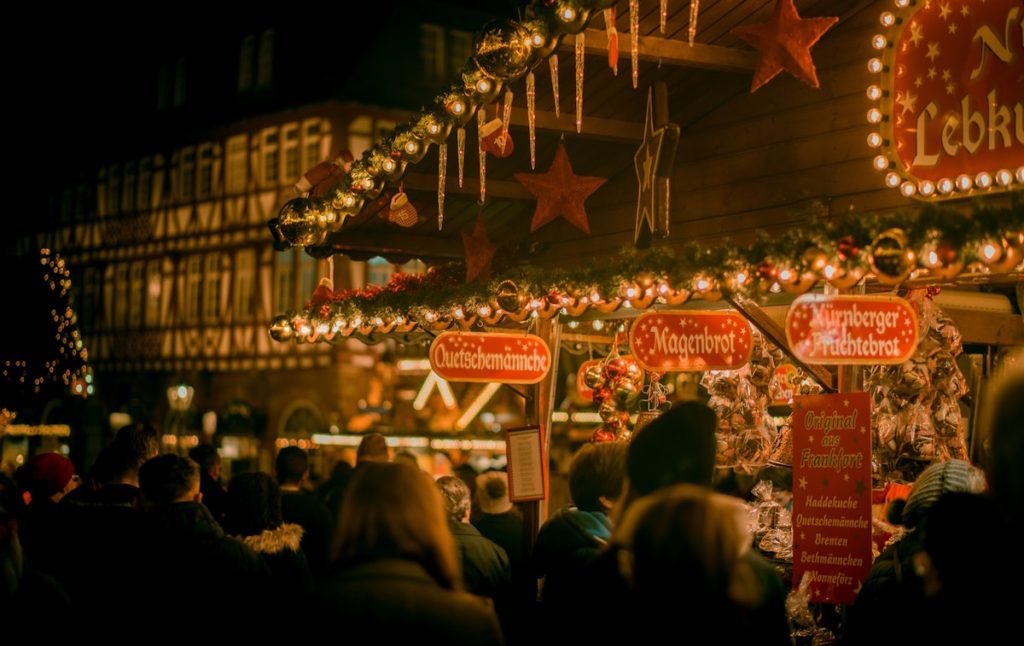
Was kostet das?
It’s inevitable you’ll end up parting with a few euros in shops, whether that’s on travel basics or souvenirs for yourself, and friends and family back home – especially if you visit a “ weihnachtsmarkt ” (Christmas market). “ Nur schauen ” (just looking); “ darf ich mit Bargeld bezahlen? ” (may I pay with cash?); “ darf ich mit Kreditkarte bezahlen? ” (may I pay with credit card?); and the aforementioned “ was kostet das? ” (how much is it?) should all be useful here.
GET INSPIRED BY: Christmas Markets of Austria, Germany and Switzerland
RELATED CONTENT: The best Christmas markets in Germany
Ich brauche einen Arzt
We sincerely hope you don’t have to use them, but if anything goes awry, “ ich brauche einen Arzt ” (I need to see a doctor) or “ fahren sie mich bitte zum Krankenhaus ” (take me to the hospital) are handy for the linguistic arsenal. Simply “ Krankenhaus” should do the job in an emergency. Consider it the word equivalent of the traveller’s first aid kit.
Sprechen sie English?
Unless you’re fluent, there will, of course, be times when you reach the limits of your German language skills. In that case, ask “ sprechen sie English?” (do you speak English?). There’s a good chance the answer will be yes; more than half of the people in Germany speak English, and more still in areas popular with travellers, such as Berlin, Hamburg, Frankfurt and Munich.
In this conversation, it might be worth adding “ Ich verstehe nicht” , meaning I don’t understand, or “ Ich spreche nicht gut Deutsch” (I do not speak German very well).
What words have you found useful when travelling in Germany? Anything other phrases you’d like to know? Let us know in the comments.
Want to hear more from us?
Sign up to receive inspiring travel articles, offers & news
" * " indicates required fields
Privacy Overview
Sign up for our emails (popup).
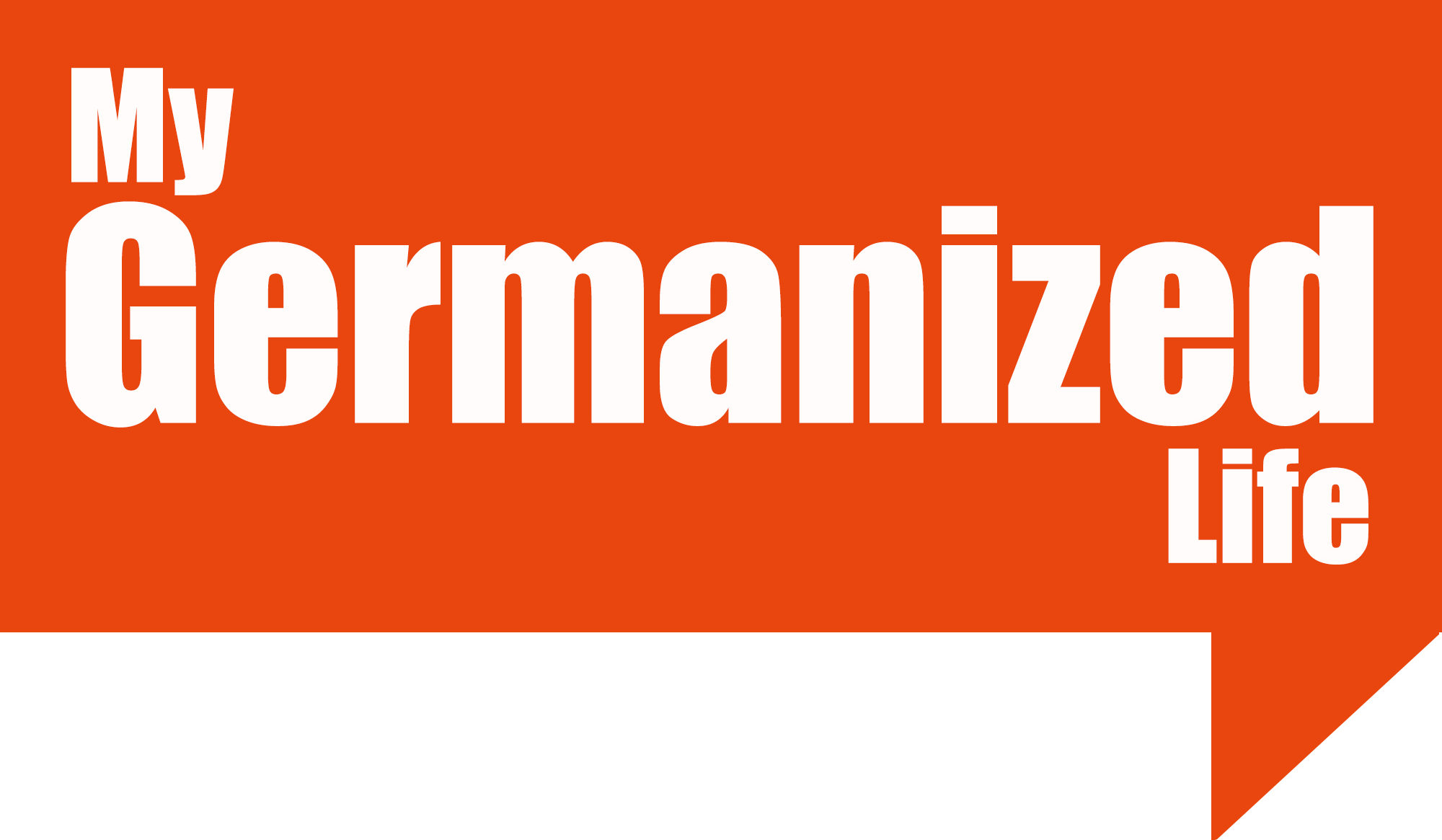
Wilkommen zusammen! Welcome everyone! Today you’re going to learn some useful German travel phrases that are essential for your trip to Germany. I assume you’ve already learned some basic words like Guten Tag and Danke Schön, so we’re going to dive right into some new German phrases .
German Phrases for Transportation and Directions
Entschuldigung, wo ist das WC? – Excuse me, where is the restroom?
Es ist um die Ecke – It’s around the corner
In welcher Richtung ist der Bahnhof? – Which direction is the station?
Nach links/rechts – To the left/right
Sie müssen links/rechts/geradeaus laufen/fahren – You have to walk/drive left/right/straight
Wann fährt der nächste Bus? – When is the next bus?
Können Sie mir bitte zeigen wie der Fahrkartenautomat funktioniert? – Can you please show me how the ticket machine works?
Wie weit ist es bis zur Stadtmitte? – How far is it to the city center?
Es ist etwa 500 meter entfernt – It’s about 500 meters away
Wo ist der Eingang/Ausgang? – Where is the entrance/exit?
Sie müssen mit dem Aufzug ins Erdgeschoss – You have to take the elevator to the ground floor
Wo kann man hier parken? – Where can I park here?
Ich habe mich verlaufen/verfahren – I’m lost (by foot or by vehicle)
Es gibt ein Parkhaus in der Lindenstraβe – There’s a parking garage in the Linden street
German Travel Phrases for Checking in to Your Hotel
Haben Sie eine Reservierung? – Do you have a reservation?
Ich habe eine Reservierung – I have a reservation
Haben Sie ein Zimmer frei? – Do you have a room available?
Ich möchte zwei Nächte bleiben – I want to stay for two nights.
Um wie viel Uhr darf ich einchecken? – At what time can I check in?
Um wie viel Uhr muss ich auschecken? – When do I have to check out?
Wie ist Ihre Name? – What is your name?
Mein Name ist – My name is
Haben Sie WLAN? – Do you have WIFI?
Wie lautet das WLAN-Passwort? – What is the wifi password?
Um wie viel Uhr gibt es Frühstück? – What time is breakfast?
Frühstück ist von sieben (7) Uhr bis elf (11) Uhr – Breakfast is from 7am until 11am
German Travel Phrases for Shopping at the Store
Kann ich Ihnen helfen? – Can I help you?
Suchen Sie etwas bestimmtes? – Are you looking for anything in particular?
Ich schaue mich nur um – I’m just looking around
Wie viel kostet das? – How much does this cost?
Es kostet 9.99 – It costs 9.99
Wo finde ich Lederhosen? – Where can I find Lederhosen?
Im Gang vier – In aisle four
Haben Sie die Schuhe in Gröβe 39? – Do you have the shoes in size 39?
Um wie viel Uhr machen Sie zu? – What time do you close?
Um wie viel Uhr machen Sie auf? – What time do you open?
Kann ich mit Kreditkarte bezahlen? – Can I pay by credit card?
Ich bräuchte eine Tüte bitte – I’m going to need a bag please
German Travel Phrases for Friendly Conversation
Es freut mich dich/Sie kennenzulernen – It’s nice to meet you
Woher kommen Sie? Woher kommst du? – Where are you from
Ich komme aus Bayern – I come from Bavaria
Sollen wir uns hinsetzen? – Should we sit down?
Sind Sie zum ersten mal in Deutschland? – Is it your first time in Germany?
Wie gefällt es Ihnen? – How do you like it?
Es ist wunderschön – It’s wonderful
Wie lange bleiben Sie? – How long are you staying?
Ich bleibe zwei Wochen – I’m staying for two weeks
German Phrases for When You Don’t Understand
Mein Deutsch ist nicht sehr gut – My German is not very good
Könnten Sie bitte langsamer sprechen? – Could you speak slower please
Können Sie das bitte wiederholen? – Can you repeat that please
Was bedeutet diese Wort? – What does this word mean?
Ich habe leider nicht verstanden – I’m afraid I didn’t understand
Similar Posts
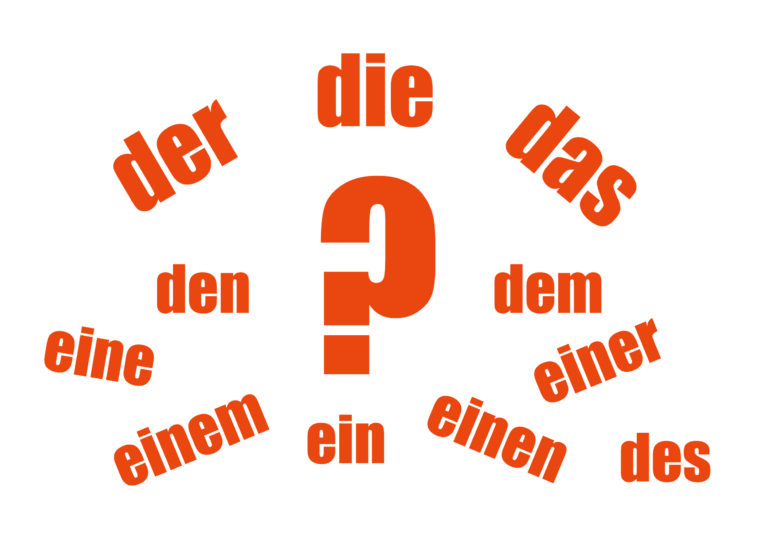
German Noun Gender: der, die, or das?
One difference between English and German that stands out immediately is the German noun gender. In English, we don’t have gendered nouns, so why does German need three? Does it really matter which gender you assign to a noun? Although people usually understand you despite using an incorrect noun gender, learning the German genders and…
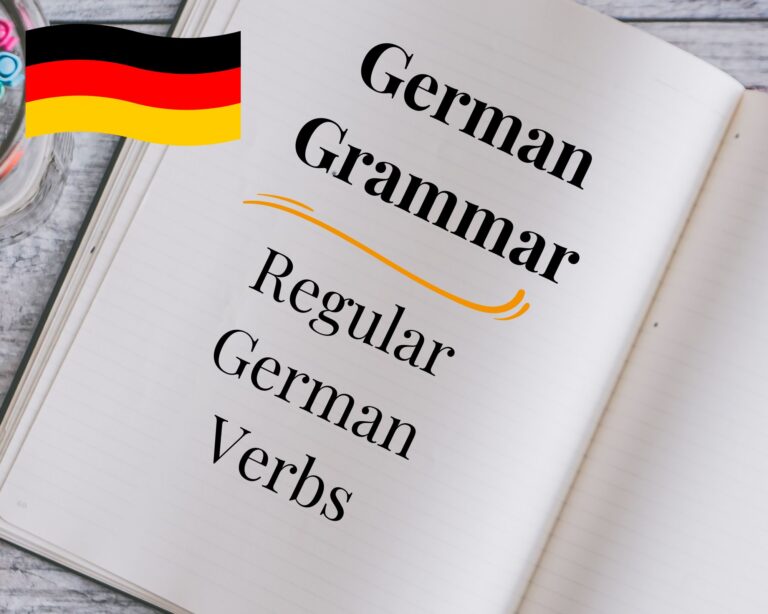
Regular German Verbs and How to Use Them
36 Regular German Verbs and How to Use Them In the German language, there are many verbs, but they can be divided into two groups: regular verbs and irregular verbs. Regular or weak verbs follow a simple pattern in the present tense, making them an excellent starting point for beginners. Learning how to conjugate German…
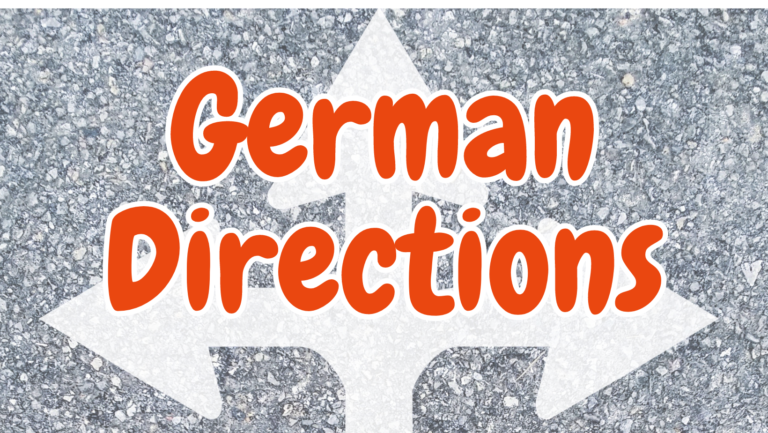
German Phrases for Directions So You Never Get Lost
In this post, you’ll learn practical German phrases for directions. When approaching strangers for directions in German, it’s common to use the formal “Sie,” so that’s what we will be using in the following phrases. You can play the video below to listen to the phrases. Then, practice your pronunciation by repeating the phrases. Compass…
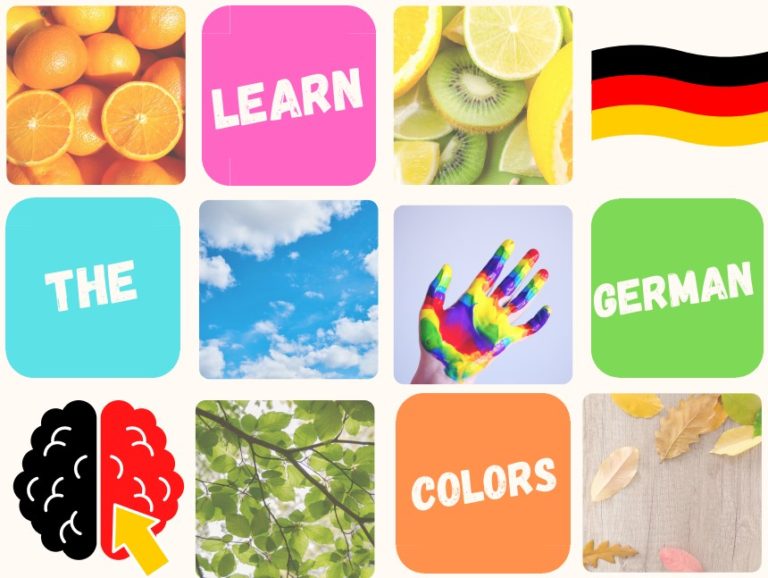
German Colors and Shapes Vocabulary
Have you ever wondered how to say the colors in German? Colors are a fun and easy way to start learning the German language and can enrich your conversations as you begin speaking. Another compelling reason to start with German colors is that they will ease you into one of the essential grammar topics: the…
50 German Doctor Phrases for When You Feel Krank
When traveling in Germany, you never know when you might need to go to the doctor. These German doctor phrases will help you communicate your issues effectively. Emergency Phrases in German Bitte rufen Sie einen Krankenwagen. – Please call an ambulance. Rufen Sie bitte die 112 an! – Please call 112 Ich habe einen medizinischen…
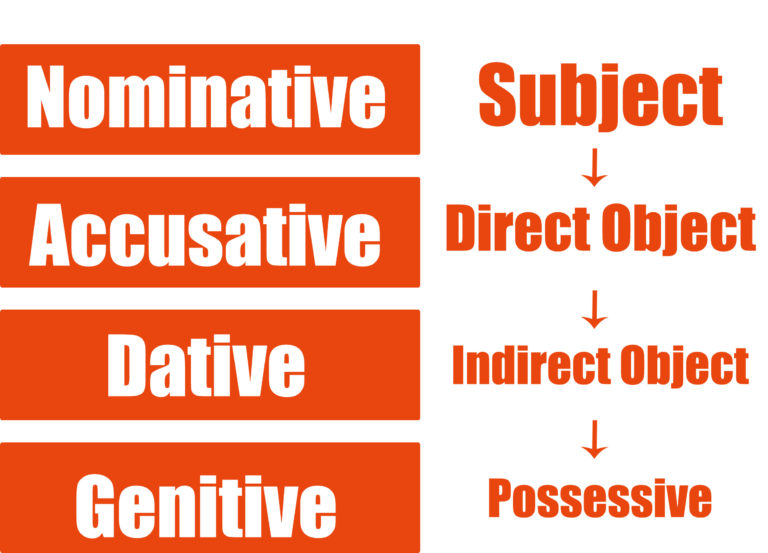
The German Cases Beginner’s Guide
German has four cases that include the nominative, accusative, dative, and genitive. But what do they mean, and how should you know which one to use when? This beginner’s guide introduces you to German cases and helps you understand the concept behind this unusual grammar topic. As English speakers, the idea of German cases may…

Useful German Phrases For Everyday Use (Free PDF)
So you're looking for German sentences to practice while you're waiting for your flight to Germany or before meeting your German friends. Then look no more 'cause we got you here - Useful German Phrases , also available as PDF (in case you wanna download or print it). 👩🏻💻
While learning grammar is essential when you're learning a new language, practising phrases that will come in handy when you need them is also important.
Whenever a native speaker asks you about your day or direction, then you know how you're going to answer that. Sometimes you understand the question but you can't respond fully in perfect German, but what matters is, you can communicate through your little knowledge of common German phrases.
So let's start learning those useful German phrases you'll encounter every day.
↘️ Download the Useful German Phrases PDF form here ↙️
German phrases and expressions you can use in the kitchen and while eating
In the Kitchen:
- Wo ist ...? - Where is ...?
- Ich brauche ... - I need ...
- Haben Sie ...? - Do you have ...?
- Wie viel ... brauchen wir? - How much ... do we need?
- Welches Rezept verwenden wir? - Which recipe are we using?
- Kannst du mir beim Schneiden helfen? - Can you help me with chopping?
- Lass uns das Gemüse waschen. - Let's wash the vegetables.
- Stell den Ofen auf ... Grad. - Set the oven to ... degrees.
- Rühre den Teig gut um. - Stir the batter well.
- Warte, bis es kocht. - Wait until it boils.
- Das Essen ist fertig. - The food is ready.
- Bon appétit/Guten Appetit! - Enjoy your meal!
While Eating:
- Das Essen sieht köstlich aus. - The food looks delicious.
- Es schmeckt hervorragend! - It tastes excellent!
- Danke für das leckere Essen. - Thank you for the delicious meal.
- Kannst du mir bitte das Salz reichen? - Could you pass me the salt, please?
- Möchtest du noch etwas Wasser? - Would you like some more water?
- Könntest du mir die Serviette geben? - Could you pass me the napkin?
- Darf ich bitte noch eine Portion haben? - May I have another portion, please?
- Das Dessert war köstlich. - The dessert was delicious.
- Ich bin satt. - I am full.
- Es hat mir sehr gut geschmeckt. - I enjoyed it very much.
- Das war ein großartiges Mahl. - That was a great meal.
- Haben Sie noch einen Tipp für ein traditionelles Gericht? - Do you have any tips for a traditional dish?
German Phrases When Buying or Ordering
These phrases will be useful whether you are shopping in a store, ordering food in a restaurant, or making purchases in various settings. Remember to be polite and use appropriate greetings when interacting with salespeople or service staff. Viel Spaß beim Einkaufen! (Enjoy your shopping!)
- Ich möchte gerne ... - I would like to have ...
- Was können Sie empfehlen? - What do you recommend?
- Ich nehme ... - I'll take ...
- Wie viel kostet das? - How much does that cost?
- Haben Sie das in einer kleineren/größeren Größe? - Do you have this in a smaller/bigger size?
- Haben Sie das auch in einer anderen Farbe? - Do you have this in a different color?
- Kann ich das bitte anprobieren? - Can I try this on, please?
- Gibt es eine Garantie für dieses Produkt? - Is there a warranty for this product?
- Wo ist die Kasse? - Where is the checkout?
- Akzeptieren Sie Kreditkarten? - Do you accept credit cards?
- Kann ich mit Bargeld bezahlen? - Can I pay with cash?
- Gibt es hier einen Rabatt? - Is there a discount available here?
- Ich würde gerne etwas umtauschen. - I would like to exchange something.
- Ich habe einen Gutschein. - I have a voucher/coupon.
- Könnten Sie mir eine Quittung geben? - Could you give me a receipt?
- Entschuldigung, ich habe mich umentschieden. - Sorry, I changed my mind.
- Das ist zu teuer. - That is too expensive.
- Haben Sie eine Kundenkarte? - Do you have a customer card?
- Darf ich bitte die Rechnung haben? - May I have the bill, please?
- Vielen Dank für Ihre Hilfe. - Thank you very much for your help.
German phrases while traveling and asking for directions and places
These phrases will be helpful when navigating through a new city or asking for directions to specific places while traveling in a German-speaking country. Don't be afraid to ask locals for help, as most people are happy to assist tourists in finding their way around. Viel Spaß beim Reisen! (Enjoy your travels!)
- Entschuldigung, könnten Sie mir bitte helfen? - Excuse me, could you please help me?
- Wie komme ich zum/zur ...? - How do I get to the ...?
- Ist es weit von hier? - Is it far from here?
- Gehen Sie geradeaus/rechts/links. - Go straight/right/left.
- Biegen Sie an der nächsten Kreuzung ab. - Turn at the next intersection.
- Es ist in der Nähe/weit weg. - It's nearby/far away.
- Entschuldigung, ich habe mich verlaufen. - Excuse me, I'm lost.
- Könnten Sie das auf der Karte zeigen? - Could you show that on the map?
- Ist dieser Ort in der Nähe von ...? - Is this place near ...?
- Wo kann ich ein Taxi finden? - Where can I find a taxi?
- Gibt es hier eine Bus-/U-Bahnstation? - Is there a bus/subway station here?
- Wie lange dauert es, um zum ... zu gelangen? - How long does it take to get to ...?
- Wie viel kostet eine Fahrkarte nach ...? - How much does a ticket to ... cost?
- Ist dieser Zug/Bus/Richtung ...? - Is this train/bus going to ...?
- Entschuldigung, ich bin fremd hier. - Sorry, I'm not from around here.
- Könnten Sie mir ein gutes Restaurant empfehlen? - Could you recommend a good restaurant?
- Wo ist die nächste Sehenswürdigkeit? - Where is the nearest tourist attraction?
- Ich suche ein Hotel in der Nähe. - I'm looking for a hotel nearby.
- Könnten Sie bitte langsamer sprechen? - Could you please speak more slowly?
Useful German Phrases At Workplace
- Guten Morgen! - Good morning!
- Guten Tag! - Good day!/Hello!
- Wie kann ich Ihnen helfen? - How can I help you?
- Danke schön. - Thank you very much.
- Bitte schön. - You're welcome.
- Entschuldigung. - Excuse me/I'm sorry.
- Natürlich. - Of course.
- Kein Problem. - No problem.
- Ich verstehe nicht. - I don't understand.
- Können Sie das bitte wiederholen? - Could you please repeat that?
- Langsam bitte. - Slowly, please.
- Wie viel Zeit haben wir dafür? - How much time do we have for that?
- Ich bin fertig. - I'm finished/done.
- Was denken Sie darüber? - What do you think about it?
- Bitte nehmen Sie Platz. - Please have a seat.
- Ich habe eine Frage. - I have a question.
- Ich brauche Ihre Hilfe. - I need your help.
- Können Sie mir bitte weiterhelfen? - Could you please assist me?
- Das Projekt läuft gut. - The project is going well.
- Gibt es Neuigkeiten? - Any news/updates?
- Bitte geben Sie mir ein Feedback. - Please give me feedback.
- Wann ist die Frist? - What is the deadline?
- Wir müssen das besprechen. - We need to discuss that.
- Ich habe eine Idee. - I have an idea.
- Darf ich etwas vorschlagen? - May I suggest something?
Remember to adjust the level of formality depending on your workplace culture and the person you are talking to. "Sie" is the formal form of address, while "du" is the informal one. It's generally better to start with the formal "Sie" unless the person you're speaking with suggests otherwise. Also, practice pronouncing these phrases to improve your communication skills.
Useful German Phrases on a Job Interview
- Guten Tag! Ich freue mich, heute hier zu sein. - Good day! I'm delighted to be here today.
- Vielen Dank für die Einladung zum Vorstellungsgespräch. - Thank you very much for inviting me to the job interview.
- Ich möchte mich kurz vorstellen. - I would like to introduce myself briefly.
- Ich habe Erfahrung in ... - I have experience in...
- Meine Stärken liegen in ... - My strengths lie in...
- Ich habe an der Universität/Schule/Firma X studiert/gearbeitet. - I studied/worked at the University/School/Company X.
- Ich habe gute Kenntnisse in ... - I have good knowledge of...
- Während meiner vorherigen Anstellung war ich verantwortlich für ... - During my previous employment, I was responsible for...
- Ich bin teamfähig und kann gut im Team arbeiten. - I am a team player and can work well in a team.
- Ich bin belastbar und kann unter Druck arbeiten. - I can handle pressure and work under stress.
- Welche Herausforderungen bietet diese Position? - What challenges does this position offer?
- Was sind die Hauptaufgaben dieser Stelle? - What are the main responsibilities of this position?
- Wie sieht die Einarbeitungszeit aus? - What is the onboarding period like?
- Welche Karrieremöglichkeiten gibt es innerhalb des Unternehmens? - What are the career opportunities within the company?
- Wie ist die Unternehmenskultur hier? - What is the company culture like here?
- Wie sieht der typische Arbeitstag für diese Position aus? - What does a typical workday look like for this position?
- Welche technischen Fähigkeiten sind für diese Stelle wichtig? - What technical skills are essential for this position?
- Ich interessiere mich sehr für diese Branche. - I am very interested in this industry.
- Welche Ziele verfolgt das Unternehmen in den nächsten Jahren? - What are the company's goals for the next few years?
- Gibt es Möglichkeiten für Weiterbildungen? - Are there opportunities for further training and development?
Practice these phrases beforehand to express yourself clearly and effectively during the interview. Viel Erfolg bei Ihrem Vorstellungsgespräch! (Good luck with your job interview!)
Final Thoughts: Useful German Phrases
While this is not a complete list, those phrases are useful in common situations as you stay in Germany or any German-speaking country. But I can't emphasize it enough, learning grammar and understanding the sentence should always be your priority. Learning those German phrases by heart doesn't give you the guarantee that you will be fluent in German but still a good start.
Also...viel Spaß beim Lernen!
Clyde learned German for 6 months, passed the B2 German Certification Exam then taught the language for almost a year. Now she's working as a nurse in Germany for almost 8 years already while she blogs at the same time.
Similar Posts

'Merry Christmas' in German Language - How to greet the right way
Christmas is one of the best seasons you could ever experience in Germany. It may be cold - we had negative temperature in Berlin last week - but still no one stops me from having that Christmassy vibe. So here I am sharing the same happy vibe by teaching you how to say ''Merry Christmas''...

Bad Words In German
We have bad days and frustrating moments and so are Germans. In fact, Germany is one of the top 10 countries that swear the most. But is it necessary for German language learners to learn those swear words in German? Nope, not really. But believe me, you will remember those German bad words more quickly...

The Accusative Case In German: A Beginner's Guide
Some German learners study the language by memorising phrases according to a situation. That may work but there's a downside - you may not be able to identify the accusative case in German or maybe point out why some articles have changed in the sentence. When we formulate a simple sentence, it comprises only three...

How To Be More Polite In German: German Politeness in Speaking
You might think being polite in German is not that different from what you are used to in your language or in your country. But have you ever not wondered why individuals often find themselves in the middle of arguments and fights? Simply, because of miscommunication. Communication is important in all aspects of our life....

Romantic Phrases In German To Impress Your German 'Schatz'
Germans may not be among the most romantic men in the world but it doesn't mean that you can't be lovey-dovey to your German partner. If you're ready to thaw that coldness of your German beau, here are some romantic phrases in German that you can say to your Schatz or he might have uttered...

Why is German so difficult? Reasons Why and What Makes It More Learnable
You don't have to be a German language student to ask this - why is German so difficult to learn? When I was teaching German in a language school in Manila, almost all my students really had a hard time understanding the language and I as a teacher had to struggle with how to make...
Leave a Reply Cancel reply
Your email address will not be published. Required fields are marked *
Save my name, email, and website in this browser for the next time I comment.
Review Cart
No products in the cart.

- Privacy Overview
- Strictly Necessary Cookies
This website uses cookies so that we can provide you with the best user experience possible. Cookie information is stored in your browser and performs functions such as recognising you when you return to our website and helping our team to understand which sections of the website you find most interesting and useful.
Strictly Necessary Cookie should be enabled at all times so that we can save your preferences for cookie settings.
If you disable this cookie, we will not be able to save your preferences. This means that every time you visit this website you will need to enable or disable cookies again.
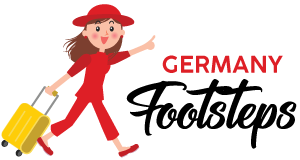
Germany Footsteps
100 Nouns Everyone Learning German Wants To Know 🤩
Want to learn German or want to learn something useful that will come in handy in Germany? Learn these nouns!
Below is a list of 100 nouns that everyone learning German should know. These words are not only fundamental to everyday conversation but also serve as building blocks for mastering the language.
When starting to learn German, it can feel overwhelming to tackle the countless vocabulary terms and grammar rules. That’s why I’ve compiled this list of nouns that are practical, relevant, and used in daily life. From common objects to important concepts, knowing these words will help you communicate more effectively and confidently in various situations.

Whether you’re preparing for a trip to Germany, starting a new language class, or simply looking to expand your vocabulary, this list will make your learning journey a little easier and a lot more enjoyable.
Join me as we dive into these must-know nouns and empower your German language skills!
Love Germany? Click here to download your free guide to 25 Incredible Things You Must Do In Germany In Your Lifetime . You won’t want to miss them!
Don’t miss the best hotel savings in Germany here >>
We are going to learn these nouns with a video lesson to help our pronunciation.
The video below presents 100 essential nouns that every German learner should know, making it a great tool for building your foundational vocabulary. The video is designed to help you quickly pick up key words, which are crucial for everyday conversations.
The video methodically introduces each noun with its pronunciation, allowing you to follow along and practice. The repetition and clear presentation make it easy to retain the information. Whether you’re just starting out or looking to reinforce your basic German skills, this video provides a practical and efficient way to expand your vocabulary.
For learners who are serious about mastering German, this video offers a straightforward and effective way to familiarize yourself with commonly used nouns, which will significantly enhance your ability to communicate in German. It’s a must-watch for beginners looking to solidify their language skills.
Many of these nouns are also quite easy to learn with some similarities to English.
You can do this!
100 Nouns Every German Beginner Must-Know by Learn German with GermanPod101.com
Some of the vocabulary taught in this lesson:
- Auto – car
- Baby – baby
- Café – cafe
- Computer – computer
- Freund – friend
- Haus – house
- Hund – dog
- Mann – man
- Frau – woman
- Junge – boy
- Mädchen – girl
- Kind – child
- Lehrer – teacher
- Schule – school
- Buch – book
- Stuhl – chair
- Tisch – table
- Tür – door
- Fenster – window
- Bett – bed
- Stadt – city
- Uhr – clock
- Woche – week
- Jahr – year
- Tag – day
- Nacht – night
- Wasser – water
- Milch – milk
- Brot – bread
- Kaffee – coffee
These are just a selection from the list of 100 nouns covered in the video. The video offers clear pronunciation and context for each word, making it an excellent resource for beginners.
Time to practise until you can say these words without thinking 🙂
Want to learn more German? Find our list of essential phrases here and a guide to turning these nouns into plurals here . You can also find all our lessons here .
Related Articles:

By Sharon Gourlay
Sharon first fell in love with Germany back in 2000 on her first visit. She loves the long history, the picturesque Old Towns, the castles, the food, everything really! Since then, she has visited many times and loves writing about Germany here so you can enjoy it too. In fact, Sharon loves German culture so much that she sent her kids to a German primary school in Australia. She especially loves Berlin and towns with charming Old Towns like Celle and Quedlinburg. Sharon also has a Certificate III in International Travel Sales and understands the nitty gritty of travel planning. Through this site, she'll help you have the perfect trip to Germany whether it's your first or tenth time!
Leave a comment Cancel reply
Your email address will not be published. Required fields are marked *
Save my name, email, and website in this browser for the next time I comment.
This site uses Akismet to reduce spam. Learn how your comment data is processed .

IMAGES
VIDEO
COMMENTS
136 Useful German Travel Phrases Planning your big trip to Germany is so exciting—but you're not done until you've brushed up on common German phrases for travel. In this post, you'll find a handy phrasebook of German travel phrases and vocabulary, conveniently organized by group.
If you're planning a trip to Germany, it's always helpful to know a few basic phrases in German to help you navigate your way around the country. This guide provides 50 essential German phrases for tourists, along with their English translations and pronunciations. From ordering food in a restaurant to asking for directions, these phrases will come in handy during your visit to Germany.
A collection of key German phrases you need to travel around Germany. Learn to order at restaurants, ask for directions, check in to your hotel, and more.
Exactly how to say 37 essential German travel phrases that will make your trip much smoother. Get it right with this written and spoken German language guide.
In this post you will discover 47 tried and tested German travel phrases that have worked well for me on my many trips to Germany. You'll also hear audio of each of the phrases. After reading this post you will: Know how to say 47 essential German travel phrases. Hear how each of the phrases sound. Be able to mix and match which ever phrases ...
In this article, we will delve into the most useful German phrases for travelers and expats, equipping you with essential German greetings, pleasantries, travel vocabulary, and more. Get ready to navigate Germany with confidence and make lasting memories.
Passport? Check. Bags? Packed. Tickets? Booked. How's your Deutsch? Get ready for your upcoming trip to Germany with this handy list of German phrases for travelers to cover every situation!
Are you planning a trip to a German-speaking country? Then you will need to learn some key vocab before you go. In this ultimate German vocabulary guide, we've compiled 100 essential phrases and basic German vocabulary list to help you navigate various situations during your travels.
Discover the top 50 German phrases for tourism and travel. Learn essential German expressions for your next trip. Useful phrases for tourists in German.
Discover our comprehensive guide to mastering basic German phrases for travelers - your key to navigating Germany with ease.
We have put together a guide to the most useful basic German words and phrases that will allow you pick up the basics on the language and really help you to survive visiting a German speaking country.
Are you planning a trip to Germany? Learn German travel phrases with GermanPod101 and download our free survival phrases PDF cheat sheet!
Learn essential German phrases to travel in Germany as comfortably as possible. Our German-English dictionary offers easy, useful German vocabulary.
From saying hi to ordering Bratwurst, here are 29 common German travel phrases to help you live your best life on your travels.
Got German? Learn your first German phrases for your traveling, meeting and greeting people, going shopping, booking hotel rooms and much much more.
Traveling in Germany is more convenient if you know basic German phrases and, in this guide, we have prepared useful German travel phrases.
German travel phrases are useful for tourists and can help you show a little respect for local German culture. In this post, we're going to look at useful German words & expressions you can use on your holiday here.
Top tip: keep these essential German phrases in your back pocket on your next trip to Germany to travel like a local.
Wilkommen zusammen! Welcome everyone! Today you're going to learn some useful German travel phrases that are essential for your trip to Germany. I assume you've already learned some basic words like Guten Tag and Danke Schön, so we're going to dive right into some new German phrases. German Phrases for Transportation and Directions Entschuldigung, wo...
Useful travel phrases in German. We travel so much these days that we're more and more likely to find ourselves visiting countries where we don't have a good grasp of the languages spoken there. more. This is why the Forvo community has created a new "travel phrases" section for the site. Here you'll find guides packed with useful phrases for ...
So you're looking for German sentences to practice while you're waiting for your flight to Germany? Awesome! Here are useful German phrases with free PDF.
German travel phrases with pronunciation. Planning a trip to Germany is thrilling, but mastering basic German phrases is crucial for a smooth journey. This guide provides a comprehensive phrasebook organized by categories, along with tips on useful resources like travel language guides and smartphone apps. Essential German Travel Phrases
Visiting Germany, Austria, or Switzerland? Here are 101 basic German phrases for travelers to give you the full local experience.
Step-by-step how to say 100 German nouns that are useful and you'll want to learn ASAP. Get it right with this written and spoken German language guide. ... Sharon also has a Certificate III in International Travel Sales and understands the nitty gritty of travel planning. Through this site, she'll help you have the perfect trip to Germany ...